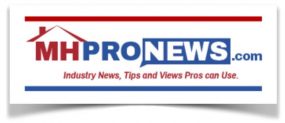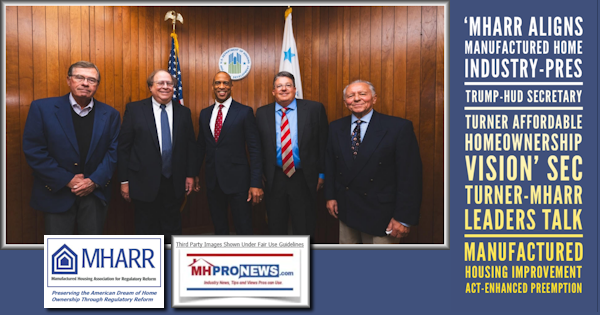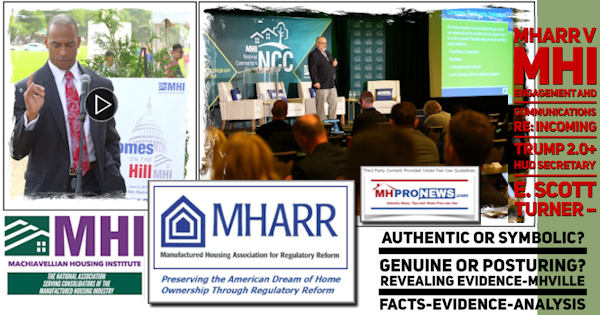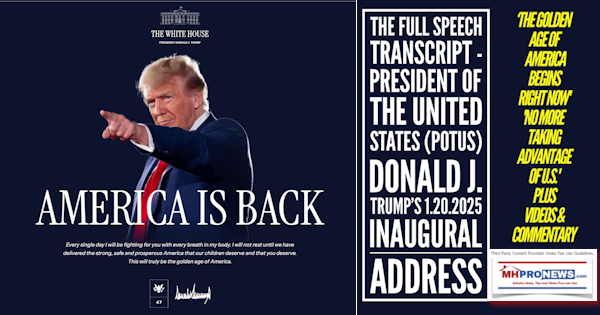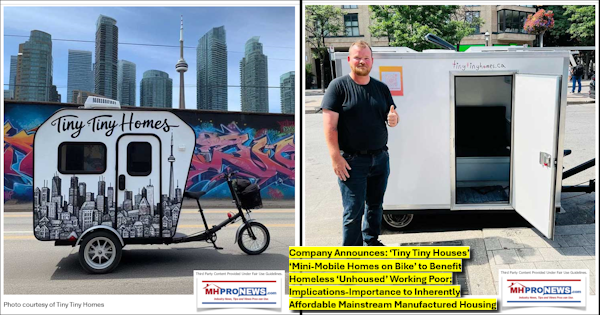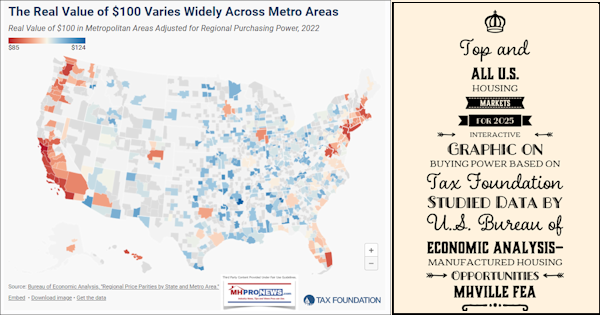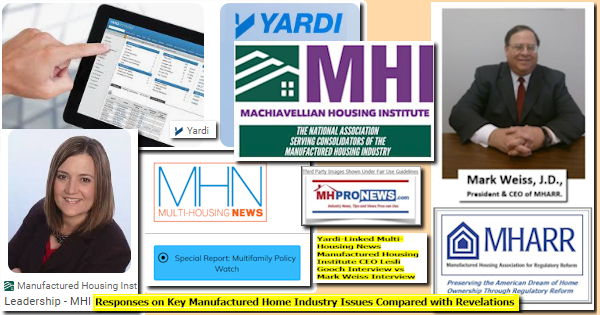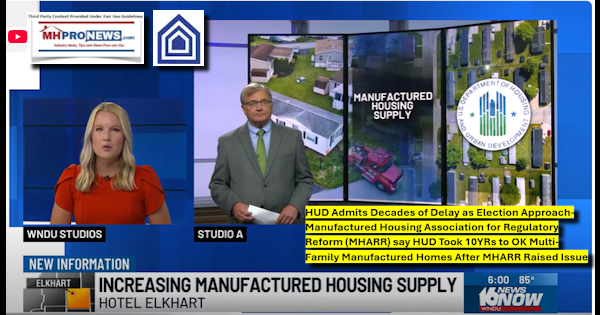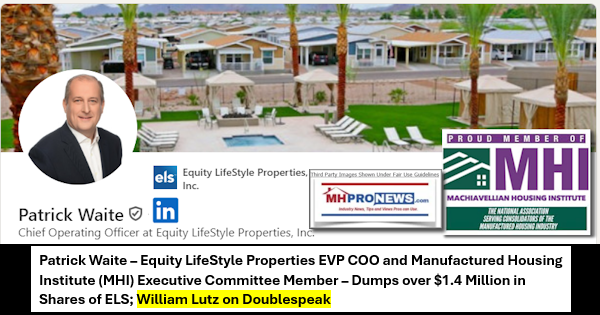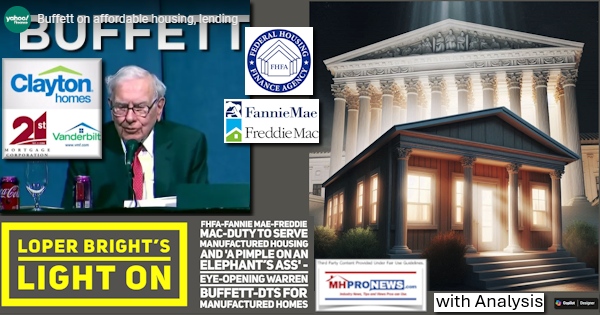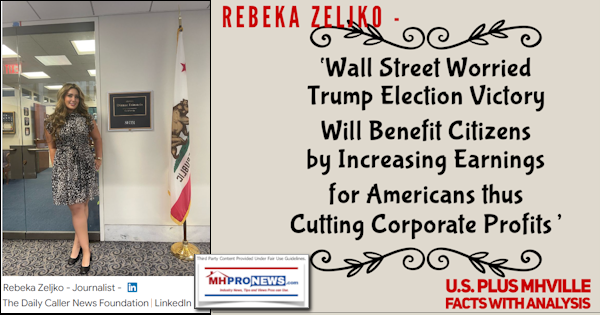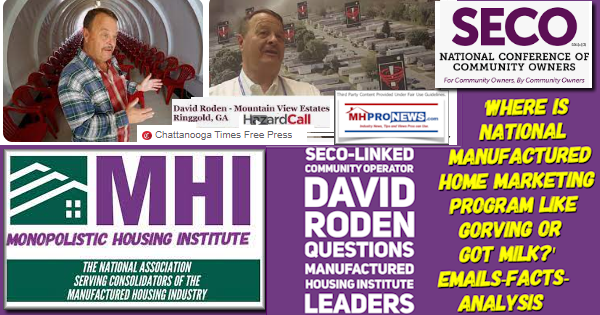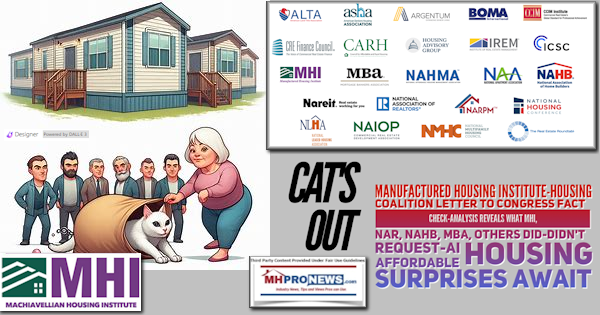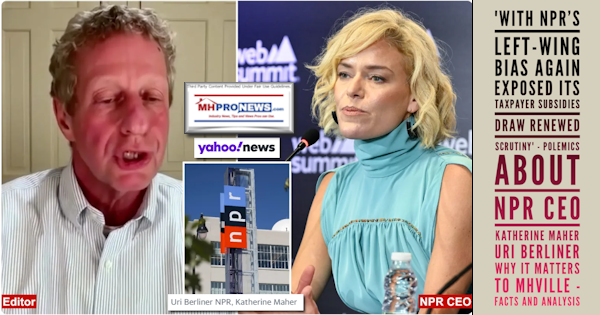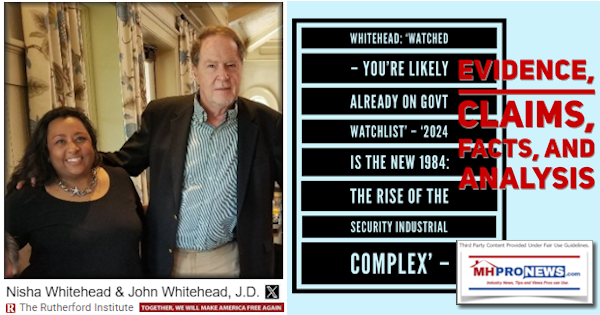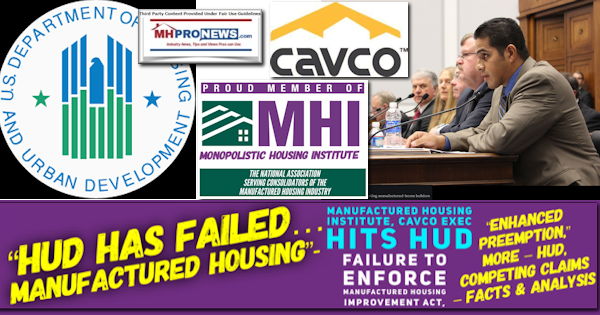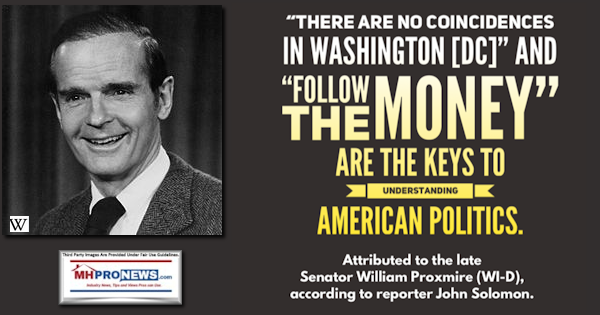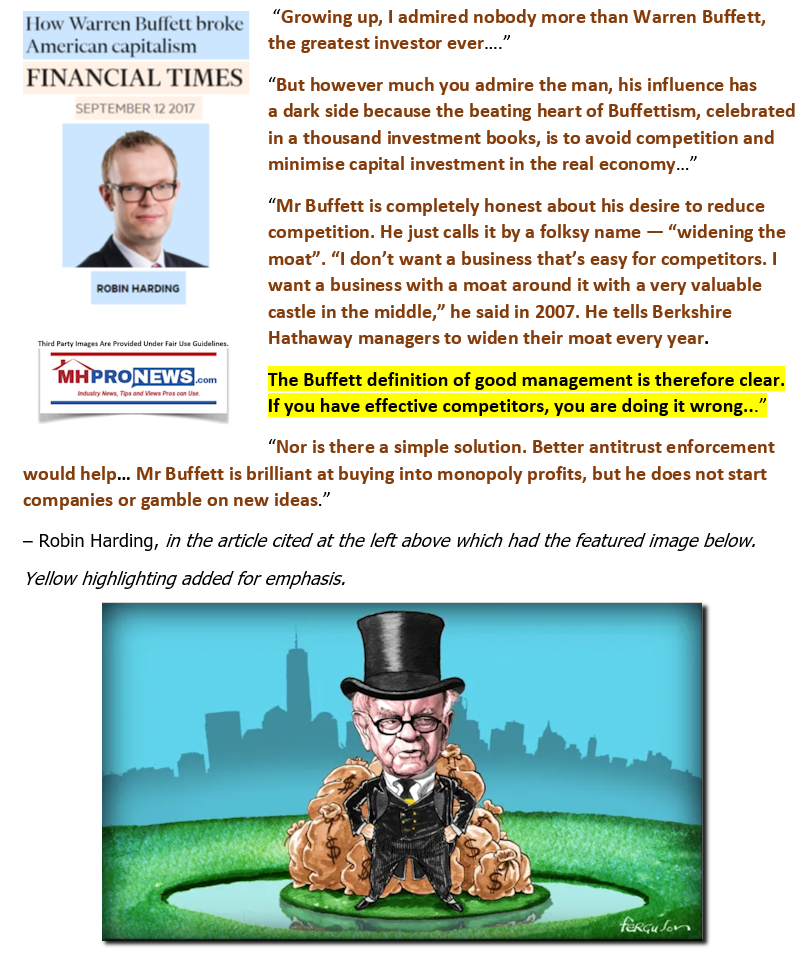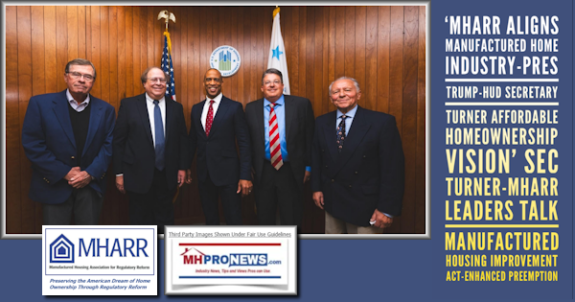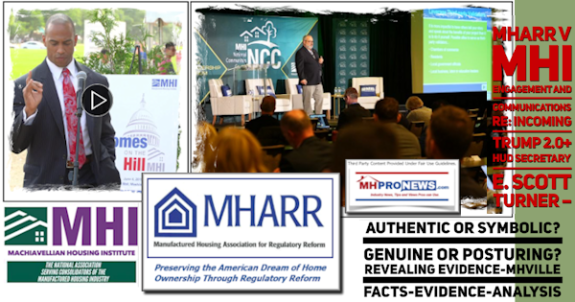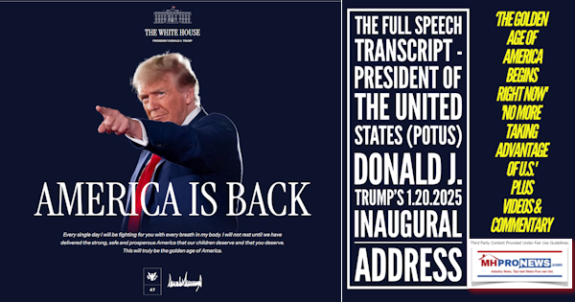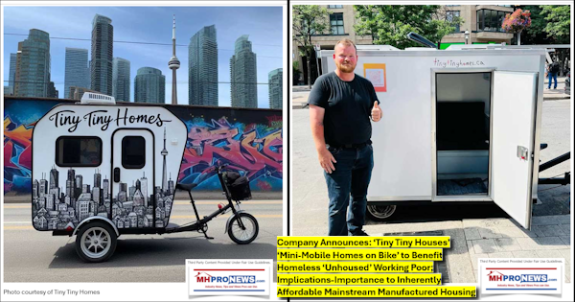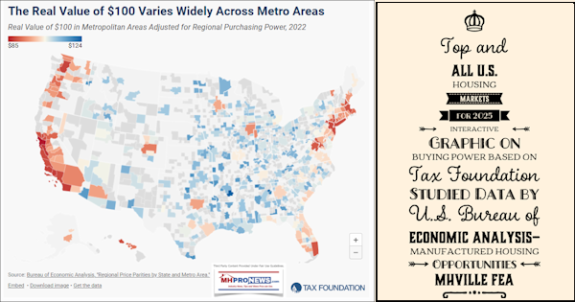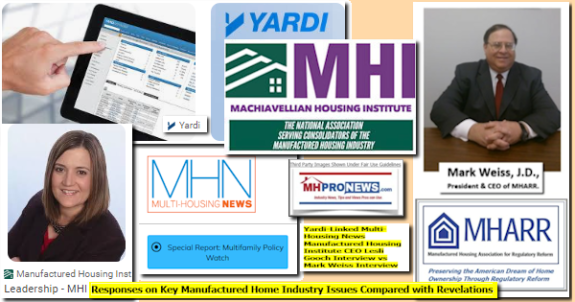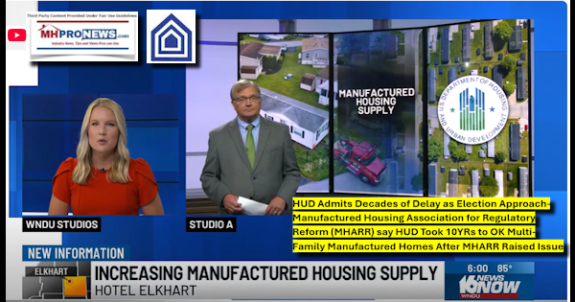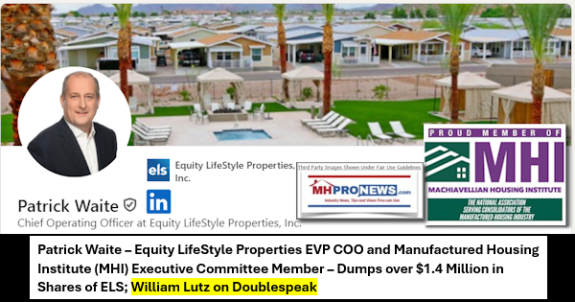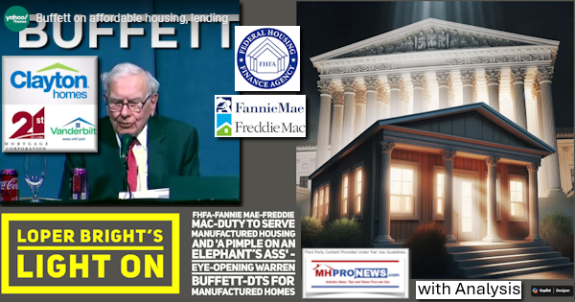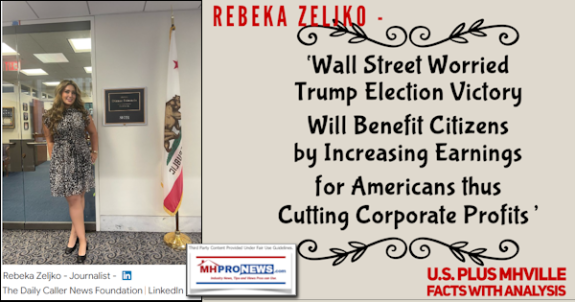In certified “truth in testimony” to a U.S. House subcommittee for Financial Services, Manuel “Manny” Santana, P.E., Director of Engineering for Cavco Industries, made pages of sometimes strongly worded statements that blast HUD for having “failed” “manufactured housing.” That claims of failure, per Santana on behalf of the Manufactured Housing Institute and obviously for his publicly traded company, was due to failure by HUD to follow the Manufactured Housing Improvement Act of 2000 (MHIA or 2000 Reform law). The complete statement by Santana on behalf of MHI in many respects might superficially seem to be similar to those delivered by the Manufactured Housing Association for Regulatory Reform (MHARR). Both, on paper, have made similar statements on the 2000 Reform law, enhanced preemption, financing, and other issues. Herein below there are also statements made on behalf of MHARR, the one from Santana for MHI, and one that was made by an attorney for HUD’s Office of Manufactured Housing Programs (OMHP). These should be considered not just for what was said, which are important. Their respective words must also be considered in the light of what followed their respective remarks. Because MHI’s CEO Lesli Gooch, Ph.D., MHARR’s President and CEO, Mark Weiss, J.D., have each said more recently that HUD continues to fail to enforce the Manufactured Housing Improvement Act of 2000 (MHIA or 2000 Reform law). Given that zoning barriers was an issue raised with HUD Secretary Marcia Fudge Key provisions in the MHIA included “enhanced preemption” for manufactured homes with respect to local zoning barriers. There is agreement that is not occurring. There is also agreement that a “non-career administrator” for the MHIA program has not been properly implemented, even though that is also required by the 2000 Reform Law. Other issues raised below by these various sources including finance, energy, and more. But an attorney for HUD testified to Congress that “enhanced preemption” is being enforced, and that HUD is working to enforce the various aspects of the federal law. That attorney, Henry S. Czauski, J.D., has since left HUD and per his LinkedIn profile, now does consulting. But Czauski’s claim has been contradicted by another former HUD attorney, William “Bill” Matchneer.
This report and analysis will examine from a range of sources and known facts a simple but critical inquiry. What’s been going on for the past 2 decades with the MHIA of 2000? What explains the decades-long failure to implement a law that was passed by a widely bipartisan margin and signed into law by a largely popular Democrat President, William “Bill Clinton?
No Title
No Description
What is obvious from that preface and what follows reflects this contention. Several members of the manufactured housing industry who are in positions of authority have for years asserted that the MHIA is not being fully and properly implemented. A HUD’s then attorney Czauski said they’re doing their jobs. Both can’t be true.
As noted, Matchneer’s statement largely aligns, and in some ways adds additional insights, that apparently reveal decades of foot dragging which both MHI and MHARR agree has limited manufactured housing industry sales and thus production. Data is provided below that may be understated as to how many thousands of independent retailers have been lost, along with dozens of manufacturers and their plants. But even at face value, those evidence-based claims reflect a big impact that has kept manufactured housing at a small fraction of its prior high in 1998.
Given that the testimony below was made to Congress, someone was apparently not being completely candid.
Indeed, the purpose of this first and other hearing statements on the implementation of the Manufactured Housing Improvement Act of 2000 (MHIA) was precisely because there has been widespread agreement that the law is not being enforced. This issue impacts literally tens of millions of affordable housing seekers, taxpayers, and the budgets of federal, state, and local officials. Its effects on manufactured home businesses and millions of current manufactured home owners also comes into focus, because financing and refi issues are raised too. Those prior statements happen to fit into the facts published earlier this year by the CFPB.

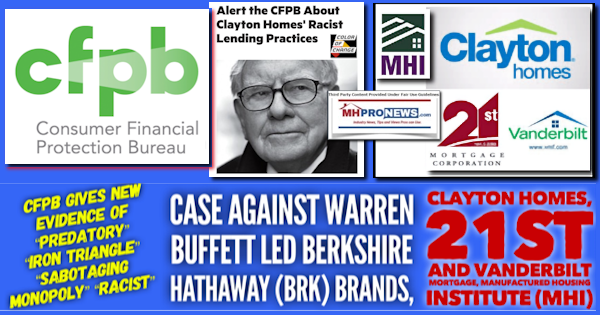
Giving false testimony to Congress can result in various charges. Other laws apparently involved can further result in criminal and/or civil liability too. That noted, let’s review what’s new and what’s been previously reported to properly frame these issues.
- Some of the items in this report are as fresh as Saturday, 10.1.2021.
- Some items herein point back to the year 2000 and since, when the MHIA was enacted. More on the timeline will follow, because it is instructive and part of the factual and evidentiary record.
- For example. One item was brought to the industry’s attention on July 22, 2021. That was the subject of an “MHI in Action” fact check involving testimony by HUD Secretary Marcia Fudge on what amounts to her take on federal preemption. Unlike Czauski, Secretary Fudge made no pretense or posturing about HUD Code manufactured home preemption. Per CSPAN video and transcript, Fudge flatly denied that aspect of the law. Fudge denied HUD’s ability to override local zoning barriers on behalf of federally regulated manufactured housing, which her agency has the primary jurisdiction over. In her video recorded statement, speaking about manufactured home zoning and placement barriers, Fudge said that “Until we start to address this we are going to continue to be perpetually in this kind of situation.” That’s blunt. She said that to a U.S. Congressman John Rose (TN-R), who appeared to be taken aback by the comment.
That merits a quick review, with the entire exchange found at the link below.
Rep. Rose said the following. Note, the CSPAN transcript is in all caps. Note Rose was apparently speaking about the percentage of manufactured housing in his district in the first sentence, as the national percentage of manufactured housing is about half that total.
 “12.9 PERCENT OF TOTAL OCCUPIED HOUSING UNITS OF MANUFACTURED HOMES MAY BE THE MOST AFFORDABLE HOMEOWNERSHIP OPTION AVAILABLE FOR MINORITIES AND UNDERSERVED AND LOW INCOME BORROWERS. 90 PERCENT OF NEW HOMES UNDER 75000 [are] MANUFACTURED HOUSING YET INCREASINGLY WE SEE SCENARIOS WHERE LOCALITIES ARE USING ZONING ORDINANCES TO EXCLUDE MANUFACTURED HOMES AND THEIR COMMUNITIES. [HUD] HAS THE AUTHORITY TO PREVENT LOCALITIES FROM EXCLUDING MANUFACTURED HOMES BUT THEY HAVE NOT UTILIZED IT HOW CAN HUD ENCOURAGE COMMUNITIES TO EXPAND AFFORDABLE HOUSING OPTIONS LIKE MANUFACTURED HOMES QUICK.”
“12.9 PERCENT OF TOTAL OCCUPIED HOUSING UNITS OF MANUFACTURED HOMES MAY BE THE MOST AFFORDABLE HOMEOWNERSHIP OPTION AVAILABLE FOR MINORITIES AND UNDERSERVED AND LOW INCOME BORROWERS. 90 PERCENT OF NEW HOMES UNDER 75000 [are] MANUFACTURED HOUSING YET INCREASINGLY WE SEE SCENARIOS WHERE LOCALITIES ARE USING ZONING ORDINANCES TO EXCLUDE MANUFACTURED HOMES AND THEIR COMMUNITIES. [HUD] HAS THE AUTHORITY TO PREVENT LOCALITIES FROM EXCLUDING MANUFACTURED HOMES BUT THEY HAVE NOT UTILIZED IT HOW CAN HUD ENCOURAGE COMMUNITIES TO EXPAND AFFORDABLE HOUSING OPTIONS LIKE MANUFACTURED HOMES QUICK.”
Sec. Fudge responded: “I WOULD DISAGREE HUD HAS ABILITY TO CHANGE LOCAL ZONING. WE DO NOT.”
“YOU DON’T SEE A WAY THAT HEAD ON – – [HUD] CAN HELP QUICK,” was Congressman Rose’s response to Fudge, per CSPAN’s transcript.
To that follow up from Rep. Rose, Fudge said at on the CSPAN video at about the 02:18:42 time mark that: “WE ARE WORKING ON IT BUT WE DON’T HAVE THE AUTHORITY TO CHANGE LOCAL ZONING LAW.” Restated, nothing is going to happen, unless consumers, voters, industry pros, and others see to it that they make something happen.
Rep. Rose did not further question or debate the issue, perhaps due to time constraints. Instead, he replied at about the 02:18:45 mark with “I YIELD BACK.”
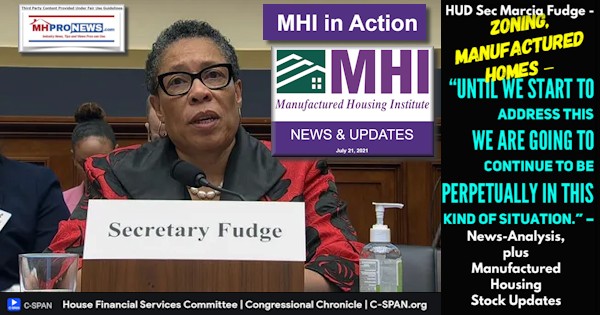
- Somehow, that disturbing claim by Sec. Fudge and interaction failed to make MHI’s “MHIA in Action” report to their members and other industry readers. That matters in potentially several legal and liability ways, as will be discussed herein, in that and other contexts. More on that below, but it goes to issues raised by Samuel “Sam” Strommen’s report to Knudson Law on what’s hampering manufactured housing during an affordable housing crisis.
- Additionally, in fairness, it should be noted that while Sec. Fudge, in a very narrow sense, could be seen as ‘correct’ – meaning, that HUD can’t “change local zoning laws.” But that is arguably mere wordplay, an apparent dodge. Per members of Congress that helped pass the MHIA, which matters for purposes of Congressional intent, said HUD has authority to override zoning under the “enhanced preemption” provision of federal law. Those representatives included members of Fudge’s Democratic political party. Those Congressional representatives said that HUD had the authority to override unjust barriers to manufactured homes, citing language much like what MHARR uses, and that MHI has at various times mirrored.
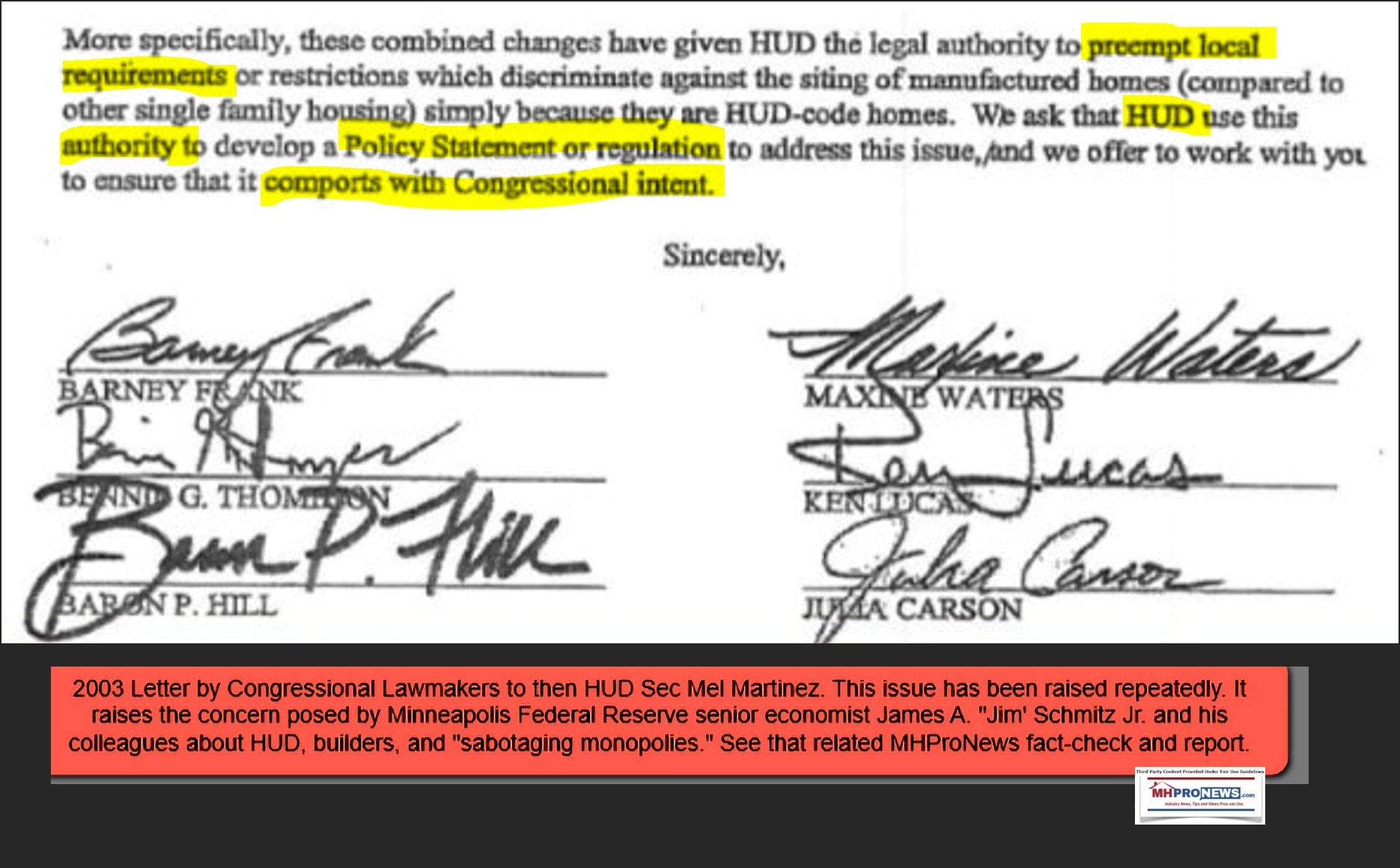
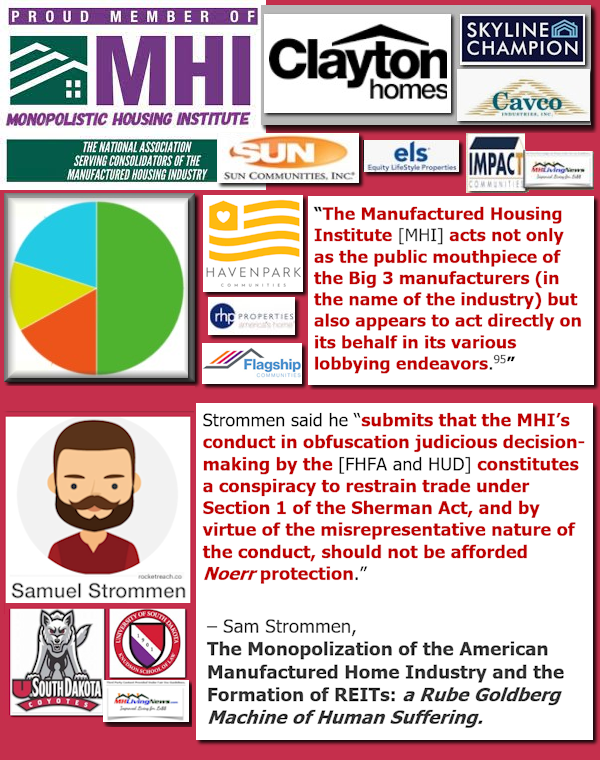
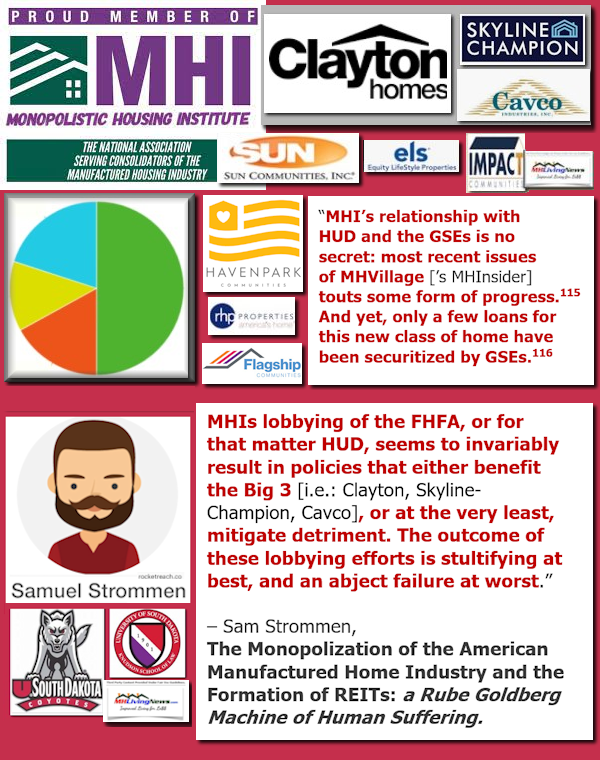
- Rephrased, Fudge is apparently in error at best, or perhaps she was being deliberately deceptive at worst. Either merits investigation. Because Rose is correct in saying that a solution is needed “quick” due to the tremendous problems caused by a lack of affordable housing. Rose and others in Congress agree that manufactured homes are an important part of that solution.
Let’s sum up to clarify this disturbing scenario, which when unpacked, may well involve various violations of several federal laws.
I. Evidence of Legal, Conflicts of Interest, and Other Problems Harming Millions of Consumers, and thousands of manufactured home professionals, plus taxpayers and others.
- HUD Secretary Fudge denied in July 2021 that HUD had authority to override local zoning that bars the placement of HUD Code manufactured homes, which her agency supervises. At a minimum, she is ignorant of the law, which given her background and response in July is problematic or worse. Fudge claims to be in favor of manufactured housing. She claims to desire to help minorities and others to get more affordable housing. This is a serious issue that merits both HUD, Congressional, and possibly other federal investigations.
- MHI failed to shoot straight with their own members on what occurred in that Fudge exchange with Congressional reps. But so far, despite mounting evidence of apparent corruption, MHI’s leadership has done nothing. For the detail mined, the evidence of apparent MHI corruption and what looks like – per Strommen – various “felony” violations is about to be increased in this report.
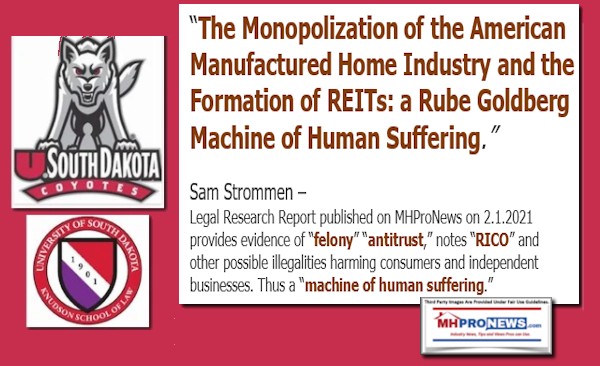
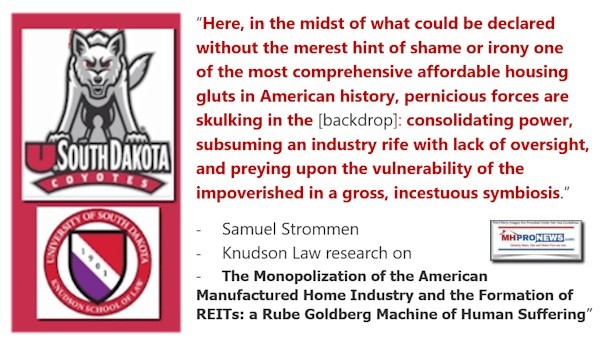
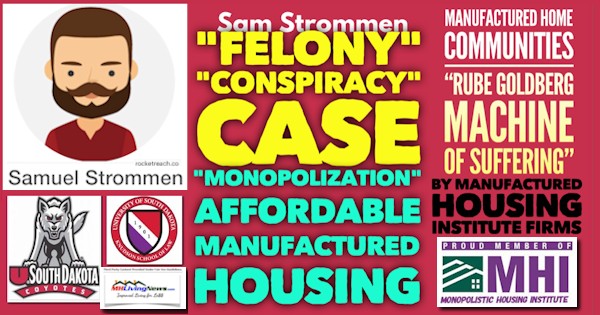
- MHARR has been consistent and persistent on the issues that they battle on behalf of, but at a glance, MHI defenders might claim that they are too. After all, this report will show MHI statements and MHARR that look similar. Specifically, MHI defenders might point to the testimony of Cavco executive Santana, similar prior testimony reported by MHProNews delivered by Kevin Clayton, CEO of Clayton Homes, also made in Congressional testimony on behalf of MHI. Previous testimony by Tom Hodges, general counsel for Clayton and currently MHI’s chairman has been referenced before and is linked here.
- But upon closer examination, the evidence reflects that MHI is quite apparently MHI leaders may be speaking much of the truth. But they are leaving a few important points out, as the Sec. Fudge–MHI in Action episode reflects. Absent the understanding of paltering – which can be a mix of the true, untrue, or misleading and unsaid – much of what has occurred in manufactured housing in the past 21 years would not be understandable.
- Restated, it is only by understanding the importance of how some people are engaged in deception and misdirection which may include the truth, but the follow up – or lack thereof -is evidence that they did not sincerely mean to implement what is apparently useful federal laws. Several on behalf of MHI and Czauski arguably fall into that category. Secretary Fudge, while she may be speaking her mind candidly, is nevertheless demonstrably wrong. So, Fudge too has potential legal problems. She should be suspended from her role, pending a thorough review. Note that for arguably lesser reasons of apparent conflicts of interest, MHProNews called on the Trump Administration not to appoint Bryan Montgomery. He was appointed, and the outcomes with respect to the MHIA and federal preemption were problematic, as was our editorially concern. See those reports to dot those i’s. Our reports and analysis, because they are fact- and evidence-based, have in recent years proven their trustworthiness.
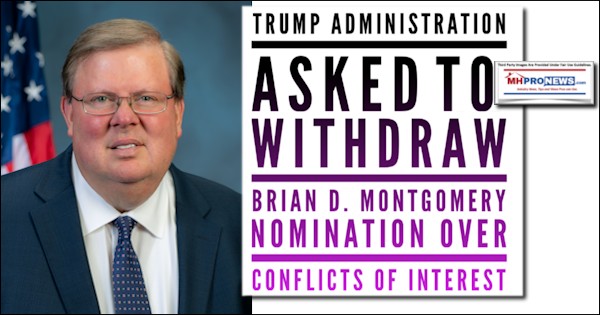
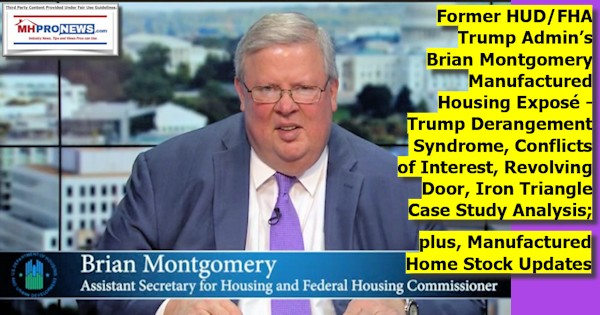
II. All of the evidence-based points that follow must be considered in the light of the following facts.
- Third-party researchers James A. “Jim” Schmitz Jr., a Minneapolis Federal Reserve researcher, who along with several other economists and experts have published several reports that claim that HUD has been working with builders and at least one named nonprofit to undermine manufactured housing.
- Samuel “Sam” Strommen at Knudson Law provided MHProNews/MHLivingNews with his independent legal research on manufactured housing. Strommen alleges that the industry is being undermined from within, and he names very specific brands and MHI. Ironically or unsurprisingly, Strommen included Cavco and Clayton in his pointed allegations. They are among those who provided testimony shown or linked herein.
- Doug Ryan is pro-manufactured housing, but has made a public allegation that MHI and Clayton have worked toward the monopolization of the industry. That happens to fit the thesis of Strommen. Note that Strommen and Ryan’s contention, which have different lengths and emphasis, compliment those of Schmitz et al. While they cover different ground, what they each claim happens to fit the broader picture.
- In this context, when Mark Weiss, J.D., saw the report by the Washington Post that MHI CEO Gooch was quoted in, Weiss addressed Beth DeCarbo, a Washington Post editor, HUD Secretary Fudge, FHFA Acting Director Sandra Thompson all by FedEx. Weiss also addressed hundreds, perhaps a thousand or more, members of the industry. He did so to complain about the mix of true and misleading claims. Weiss then posted those concerns and documents about the DeCarbo report on the MHARR website, at this link here.
- In contrast to Weiss, what did MHI CEO Gooch do following the DeCarbo article? There is no known evidence the she, or anyone at MHI, did anything. Why does that matter? That’s a key question, and the answer follows.
- Because when the history of MHI in the Berkshire era of the industry is studied, what emerges from the facts- and evidence-based pattern is evidence of posturing on behalf of “all segments” of the industry, but behavior that only benefits a few insider firms that dominate MHI and their board.
- Per Strommen, MHI’s pattern of behavior makes them liable. It also creates liability for several dominating MHI member brands, said Strommen. See Strommen’s full report, and the counterclaims by MHI defenders, linked here.
- What connects this to an article by a regional newspaper linked here and systematically unpacked here. What that pair of linked reports reveals is nothing short of stunning, but it entirely supports the contention that MHI is posturing and not doing what they claim.
- MHI leaders, HUD’s Teresa Payne, and others were given an opportunity to act on behalf of minorities that wanted a manufactured home, but who are being barred by local zoning barriers. Given a documented opportunities to act, per local authorities and local media, there has been no outreach by MHI, their state affiliate, nor from HUD.
- The only industry official that was contacted that did respond was MHARR’s Mark Weiss.
Let’s review again for clarity before showing the testimony to Congress below that backs up several of those claims noted above.
MHI has for years claimed that they are working for the interests of “all segments” of the industry. They make a similar statement in their IRS Form 990, a statement made under penalties of perjury. Furthermore, following revelations like those linked herein, MHI – whose attorneys have said monitor this publication and MHLivingNews – nevertheless doubled-down on their apparent duplicity. MHI claims this is a “critical time” for the industry, and that the answer is to become or stay a member of their trade group.
When the rubber proverbial hits the road, when MHI is asked to get involved in a case such as Ayden, NC, Bryan, TX or other such troubling zoning and placement issues, MHI routinely fails to do anything. Who says? Local officials and those involved.
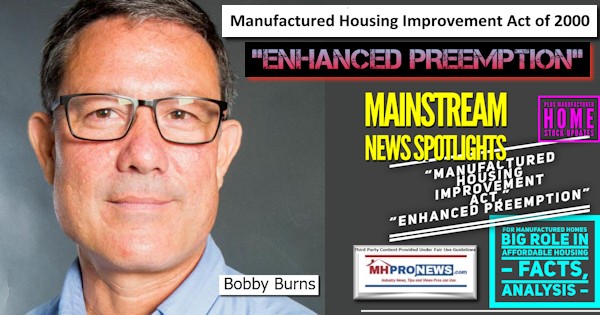
III. What Does MHI’s Apparent Deception and Duplicity of much of the Industry Mean?
- There are several possible legal vulnerabilities that result from this factual and behavioral-evidence pattern. MHI are taking dues from independents who presumably believe what they are being told.
- Then, numbers of MHI’s affiliates are also behaving in a similar fashion.
- Additionally, MHI’s dominating brands have made testimony on behalf of MHI. A common thread for approaching 20 years of troubling behavior are summed up in three letters M.H.I.
- That doesn’t in any way reduce the potential liability of MHI’s various brands, such as Clayton, 21st Mortgage Corporation, or Cavco Industries, to name a few. It does mean that investigators and regulators could begin with MHI, if they so opted, and could then circle back to the brands that Strommen and others have identified in reports published by MHProNews and/or MHLivingNews.
- Last but not least. The evidence suggests that federal officials are involved in this subterfuge, which Schmitz et all have dubbed “sabotaging monopoly” behavior. Some at HUD and the FHFA come to mind. At HUD, Secretary Fudge and Teresa Payne must be investigated, and when that investigation begins, they should be suspended from their respective roles pending the outcome. But there are certainly reasons to suspect that some at the DOE or other agencies are involved too.
- If not for the steadily increasing body of evidence that collusion has occurred to undermine independents, benefit MHI insiders, and that this occurs to the harm of consumers, taxpayers, and others, that sounds like a Gordon Gekko movie script for Wall Street or novel. But the Securities and Exchange Commission (SEC) suit vs. Cavco happens to support those claims. The SEC does not undermine that thesis at all. Rather, it supports it. Indeed, it could be that the SEC may end up broadening their probe based on such evidence.
- Note that this is occurring despite pledges by the Biden campaign website for transparency and ethical government.
What the report linked below neatly revealed is this. It is simply not plausible that MHI has failed for so many years to do what they themselves claim should be done. Keep in mind that if this writer could accomplish getting a letter like this published in a mainstream newspaper, in conjunction with a local official, then MHI surely could too. The below illustrates MHI’s failures. But it also illustrates HUD’s failure too. When Congress passes a law, it should not be necessary for trade groups to push a regulator into doing what the law requires.
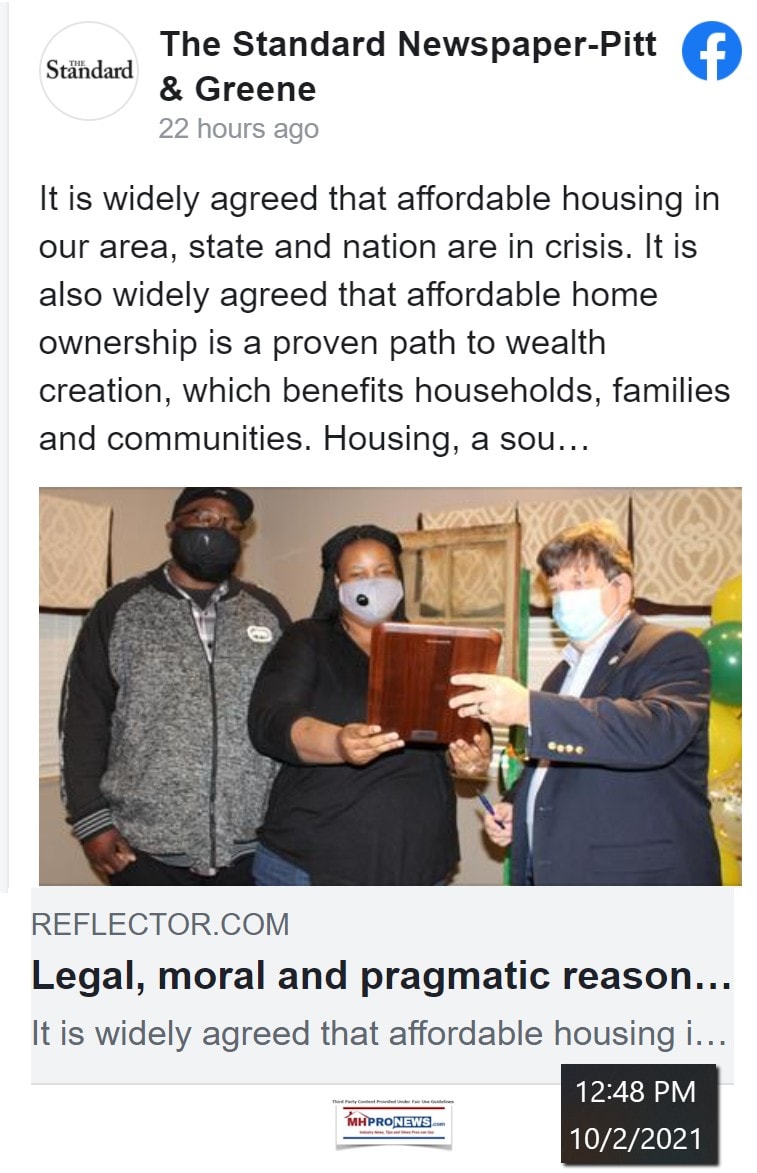
With that backdrop, here are 3 separate sources of federal testimony. The fact that these are from 2012 is useful because when juxtaposed to what MHI’s Lesli Gooch has said more recently, it makes a clear record of how this apparently illegal game is played.
Additionally, Santana’s testimony makes clear that significant harms caused by the lack of lending and the failure to implement the MHIA, particularly the “enhanced preemption” along with other parts of the 2000 Reform law. Meaning, we have examples of HUD and MHI documenting their own respective duplicity. The consistent voice in this mix has been MHARR.
- The first is from Santana.
- The second is from Czauski.
- The third and fourth are from prior MHARR chairs John Bostick (Sunshine Homes) and Edward Hussey (Liberty Homes). Then additional information, more facts, links, and analysis will follow.
That testimony from Cavco’s Santana for MHI, will be followed by pull quotes from MHI, some of their dominating brands leaders and documents, and a brief summary and conclusion. Other manufactured housing specific examples that complete the circle of what the Capital Research Center has generically called “deception and misdirection” from various sectors will complete the picture for those who are detail and evidence-minded.
Testimony of Mr. Manuel Santana, P.E.
Director of Engineering, Cavco Industries
Before the
Subcommittee on Insurance, Housing and Community Opportunity
Committee on Financial Services
U.S. House of Representatives
Hearing on
Implementation of the
Manufactured Housing Improvement Act of 2000
February 1, 2012
Washington, DC
Thank you, Chairwoman Biggert, Ranking Member Gutierrez and members of the subcommittee for the opportunity to testify this morning on the implementation of the Manufactured Housing Improvement Act of 2000.
My name is Manuel Santana and I am testifying on behalf of the Manufactured Housing Institute. I am Director of Engineering for Cavco Industries. In this capacity, I oversee the engineering departments of Cavco Industries, Fleetwood Homes and Palm Harbor Homes. I have responsibility for the engineering design, development and maintenance of our products, which range from HUD‐Code homes, factory‐built housing and recreational park trailers. My tasks include maintaining relations with Department of Housing and Urban Development (HUD) inspectors, In‐plant Primary Inspection Agencies (IPIAs), Design Approval Primary Inspection Agencies (DAPIAs) and state and local officials. I am a member of the International Code Council (ICC) and registered as a Professional Engineer in Arizona, California, Colorado, Georgia, Nevada, New Mexico and Texas. In addition, I currently serve on HUD’s Manufactured Housing Consensus Committee (MHCC).
MHI AND CAVCO INDUSTRIES
The Manufactured Housing Institute (MHI) is the national trade organization representing all segments of the factory‐built housing industry. MHI members include home builders, lenders, home retailers, community owners, suppliers and others entities affiliated with the industry. MHI’s membership includes 50 affiliated state organizations. MHI members currently build 80 percent of all manufactured homes in this country.
Headquartered in Phoenix, Arizona, Cavco Industries, Inc. designs and produces factory build housing and is the nation’s second largest producer of HUD Code manufactured homes, which are marketed under a variety of brand names including Cavco Homes, Fleetwood Homes, Palm Harbor Homes and Nationwide Homes. Cavco is also a leading producer of park model homes, vacation cabins, modular homes, and systems‐built commercial living structures. Together with its subsidiaries Fleetwood, Nationwide and Palm Harbor, Cavco operates 15 homebuilding production facilities across the country and employs more than 2,500 people.
MANUFACTURED HOUSING
Manufactured housing is a key source of quality affordable single‐family housing for 19 million
Americans. During this critical time for our nation’s housing markets, manufactured housing can play an even greater role in providing reliable sustainable housing for current and future homeowners looking to meet a variety of housing and lifestyle needs.
Manufactured homes are built in a controlled environment, transported to the building site, and installed on the home‐site in accordance with federal building codes and enforcement regulations administered by the Department of Housing and Urban Development (HUD). These governing rules are commonly referred to as the “HUD Code.” Since HUD oversees and regulates virtually every facet of the construction process, manufactured housing is one of the most heavily regulated industries in the construction field.
As the only federally‐regulated national building code, the HUD Code regulates home design and construction, installation requirements for strength and durability, resistance to natural hazards, fire safety, electrical systems, energy efficiency, and all other aspects of the home. Homes are inspected every step of the way and our industry adheres to a robust quality assurance program which offers far greater controls than anyone else in the home building industry.
The affordability of manufactured housing can be attributed directly to the efficiencies emanating from the factory‐building process. The controlled environment and assembly‐line techniques remove many of the challenges encountered during traditional home construction, such as poor weather, theft, vandalism, damage to building products and materials and unskilled labor. Factory employees are trained and managed more effectively, efficiently, and a with a higher degree of safety than the system of contracted labor employed by the site‐built home construction industry.
Manufactured housing‘s importance as a sustainable source of affordable housing is reinforced by data (according to the U.S. Census Bureau) indicating that in 2010 it accounted for:
- 72 percent of all new homes sold under $125,000;
- 47 percent of all new homes sold under $150,000; and
- 27 percent of all new homes sold under $200,000.
Manufactured homes serves many housing needs in a wide range of communities—from rural areas where housing alternatives (rental or purchase) are few and construction labor is scarce and/or costly (nearly two of three manufactured homes are located in rural areas), to higher‐cost metropolitan areas as in‐fill applications. Without land, the average purchase price of a new manufactured home is $62,800 versus $206,500 (excluding land costs) for a new site‐built home (Source: U.S. Census Bureau), which is affordable by almost any measure.
In addition to the valuable role it plays in providing reliable, efficient and affordable housing for 19 million Americans, the manufactured housing industry is an important economic engine. In 2010, the industry produced 50,000 new homes, which were produced in more than 120 home building facilities, operated by 45 different companies, and sold in 4,000 retail home sales centers across the U.S.— generating 75,000 full‐time, good‐paying, jobs.
For manufactured homes to be a part of the solution to America’s growing housing challenges, the industry relies on the HUD Code to be a dynamic standard that supports innovation, consumer safety and quality, while preserving manufactured housing’s affordability.
THE HUD CODE AND THE MANUFACTURED HOUSING IMPROVEMENT ACT OF 2000
For over 35 years (since 1976), the HUD Code has set the quality assurance and safety standards for every manufactured home in America. HUD regulates home design and construction in the same way that state and local building codes do for site‐built homes by setting requirements for strength and durability, resistance to natural hazards, fire safety, energy efficiency and all other aspects of the home. HUD regulations also strictly govern quality control and inspection measures.
The HUD Code is specifically designed for the factory‐built environment. The inspection and enforcement process starts well before production. Plans must be approved by professional engineers and HUD, and factories must receive certification by HUD to be approved to build homes. There is then continual oversight throughout the building process and which does not end until the home receives a numbered certification label that indicates the home has been designed, constructed and inspected in accordance with the HUD Code.
In 2000, Congress passed the Manufactured Housing and Improvement Act (MHIA), which expands HUD’s mission with regard to manufactured housing, and improves the process for establishing, revising, enforcing, and updating the HUD Code. The law created the Manufactured Housing Consensus Committee (MHCC)—an advisory committee comprised of industry and responsible for recommending revisions and interpretations of the code.
Within MHIA, Congress intended for HUD to partner with the MHCC to update safety and construction standards. Specifically, Congress indicated that the key considerations that should guide the MHCC and HUD in their work include:
- Giving affordability and increasing homeownership equal weight with quality, durability and safety of homes;
- Ensuring that construction standards are practical, uniform and performance‐based;
- Encouraging innovative and cost‐effective construction techniques; and
- Ensuring that the process for developing, revising and interpreting safety and construction standards is balanced.
HUD must ensure that the HUD Code revision process can meet the increasing advancements in design that the industry makes each year. MHI believes it is crucial that HUD obtain and deploy the resources necessary to accomplish this mandate that fully engages the industry and the MHCC as envisioned in MHIA.
CHALLENGES IN IMPLEMENTING MHIA AND RECOMMENDATIONS FOR IMPROVEMENT
The MHIA’s key provisions were designed to preserve the vital role manufactured housing plays in meeting the nation’s housing needs. However, implementation of the Act has not been without challenges. There are several key action areas outlined in the Act which are not being implemented and that are of significant concern to MHI. These include provisions designed to:
- Promote innovation and affordability with timely construction codes and standards;
- Enhance preemption to streamline production and reduce regulatory barriers;
- Implement manufactured home installation standards to the benefit of consumers and industry; and
- Strengthen manufactured housing as a priority within HUD through the appointment of a noncareer administrator.
- Promote Innovation and Affordability with Timely Construction Codes and Standards
MHI believes the HUD Code is a “living” code that needs consistent attention and updating.
Unfortunately, since its establishment and initial meeting in 2002, the MHCC has met nearly 200 times and has made dozens of recommendations to revise the HUD Code. Yet ten years later, the majority of these recommended updates remains pending and awaits final action by HUD.
The MHCC has recommended three comprehensive sets of updates to the HUD Code, including numerous updates to various non‐controversial reference standards used in the residential building industry. To date, only one update, in 2005, was finalized and implemented by HUD.
The MHCC has recommended four significant rewrites of enforcement regulations and, to date, none have been implemented. Of particular importance to MHI is a proposal considered by the MHCC in 2007‐2008 to streamline the regulations for obtaining approval for designs for alternative construction. Under the current regulations (24 CFR Part 3282.14), manufacturers must obtain individual approval from HUD for each new home design or construction technique that is not in compliance with the HUD Code.
Because consumers are increasingly requesting homes with customized designs, the number and frequency of these approval requests has significantly increased. As a result, due to the inability of the HUD Code to keep pace with these practices, it often takes months to receive the required HUD approval of these non‐standard designs. These delays result in lost sales and unnecessary interruptions in the construction process, which ultimately lead to loss of jobs and lost economic opportunity for the industry.
A lack of updated codes and standards has resulted in the very certain likelihood that the manufactured housing industry will be subject to energy efficiency standards established and enforced by the Department of Energy (DOE). The Energy Independence and Security Act of 2007 (EISA; P.L. 110‐140) contains provisions requiring DOE to establish, implement and enforce compliance with energy efficiency standards for manufactured housing (Sec. 413).
The law effectively replicates HUD’s statutory responsibility for manufactured home energy standards within DOE and established a duplicative regulatory standard and system for the manufactured housing industry. MHI believes this dual regulation will have the real impact of raising the costs on affordable manufactured housing and costing jobs in an industry already suffering through a significant decline.
Enhance Preemption to Streamline Production and Reduce Regulatory Impediments
The HUD Code preempts state and local building codes affecting manufactured housing. This concept of federal supremacy is reinforced in MHIA, which states the HUD Code should be “broadly and liberally construed” to ensure that “disparate State or local requirements or standards do not affect the uniformity and comprehensiveness” of the HUD Code.
Congress recognized the importance of federal preemption as a key element to the production and distribution of manufactured housing. A single uniform building code is essential to interstate commerce and to preserving manufactured housing’s affordability.
However, there has been an erosion of the HUD Code’s preemptive identity resulting in local attempts to establish building code requirements (for manufactured housing) not required by the HUD Code. In addition, local exclusionary zoning and land use requirements continue to plague the industry and limit the availability of affordable housing.
MHI has requested HUD update its policy on preemption to reflect the expanded authority Congress specifically provided in MHIA. The MHCC, last year during consideration of proposed fire sprinkler standards, also requested HUD revisit its official policy on preemption.
- Implement Installation Standards to Benefit Consumers and Industry
HUD is empowered to enact minimum state installation standards for manufactured homes. Model Manufactured Home Installation Standards established by HUD in 2007 prescribes methods for performing specific operations or assembly of a manufactured home to ensure that compliance with the HUD Code is preserved and maintained.
The implementation of minimum installation standards and state installation programs—including licensing and training—has significantly reduced the number of consumer complaints and provided assurances that a manufactured home is installed according to design requirements.
HUD is required to develop licensing, training and enforcement programs governing the installation of manufactured homes for those states that lack individual HUD‐approved programs. However, HUD has failed to develop these programs. The development of substantive programs in these areas would greatly aid industry efforts to ensure both consumer satisfaction and product reliability is maximized.
- Make Manufactured Housing a Priority within HUD; Appoint a Non‐Career Administrator
HUD has failed to recognize manufactured housing as important to fulfilling its mission to “create strong, sustainable, inclusive communities and quality affordable homes for all.”
Indeed, despite serving as the housing choice for 19 million Americans, HUD’s FY 2010‐2015 Strategic Plan fails to mention the role manufactured housing can play meeting HUD’s programmatic mission and goals. Specifically, HUD has identified five major goals and 18 sub‐goals to fulfill its mission. However, agency’s manufactured housing program is only given cursory mention and a limited scope related to HUD’s overall mission —“to protect and educate consumers when they buy, refinance or rent a home.”
A key provision within the law is for HUD to appoint a non‐career administrator to oversee the agency’s manufactured housing program. Congress intended the administrator to oversee the development of codes and standards and to serve as an advocate for manufactured housing in HUD’s overall mission, policies and programs. However, this position remains vacant.
HUD’s FY2012 budget envisions an increase in the label fee paid by home manufacturers to offset the expenses incurred by the agency in carrying out its regulatory responsibilities. However, it is unclear whether increasing label fees will translate into a more effective program. We were pleased to hear in HUD’s testimony before this committee in November that the MHCC will have the opportunity to evaluate any fee increase proposed by HUD.
With recent budget cuts to HUD’s manufactured housing program and increases in labeling fees imposed on manufactured homes producers, the need for a key advocate to serve the larger manufactured housing market has never been greater. In considering a label fee increase, it is necessary to thoroughly evaluate current program initiatives to accurately determine if the agency is meeting program priorities within the existing budget confines. Appointing a non‐career administrator for the manufactured housing program is essential an essential first step that should be taken prior to the adoption of any fee increase.
MANUFACTURED HOUSING INDUSTRY AND CONSUMER FINANCING CHALLENGES
Despite its role as a valuable source of affordable housing; a driver of the U.S. economy; and a model of efficiency and sustainability in the larger housing industry, the manufactured housing industry has had ongoing challenges over the past decade. Since 2005, the pace of new manufactured homes sold in the U.S. has declined by 65 percent (146,881 in 2005 vs. 50,046 in 2010) and there has been a decline of nearly 80 percent since 2000 (when 250,419 new manufactured homes were produced).
The decline in home sales and activity within the manufactured housing market and its resulting job losses coincides with a number of challenges:
- the lack of liquidity and credit in the manufactured housing finance sector has limited financing options for our homebuyers;
- the uncertainty and impact of new financial services and mortgage finance regulations has hindered growth; and
- the slow pace of adoption for new standards within the HUD Code has prevented the manufactured housing industry from remaining on the cutting‐edge of design and construction.
While the manufactured housing industry would benefit from an up‐to‐date building code and a responsive and engaged regulatory body and is appreciative of the subcommittee’s willingness to examine and evaluate MHIA’s impact and effectiveness, the single most important issue impacting the manufactured housing market remains the availability of accessible and affordable financing for those seeking to purchase manufactured housing.
Lack of a viable secondary market for manufactured home loans coupled with growing regulatory burdens threaten to further constrict the limited financing options that currently exist within the manufactured housing market.
Over the past year, MHI has worked to educate Members of Congress and the Administration regarding some of the unforeseen impacts recently enacted legislation would have on limiting access to credit for the purchase of affordable manufactured housing.
Specifically, provisions within the Dodd‐Frank Wall Street Reform and Consumer Protection Act (P.L. 111‐203) and the Secure and Fair Enforcement of Mortgage Licensing Act (SAFE Act; P.L. 110‐289) would have the very real unintended consequence of limiting the availability of and access to credit for the purchase of affordable manufactured housing.
Fortunately, MHI has been working with majority and minority leaders of the House Financial Services Committee to develop a bipartisan solution to these issues that will provide relief for manufactured homeowners while maintaining consumer protections.
New manufactured home construction has fallen roughly 80 percent over the past decade, which has accounted for more than 160 plant closures, more than 7,500 home center closures, and the loss of over 200,000 jobs. More importantly, thousands of manufactured home customers have been left unable to purchase, sell or refinance homes. Without action in these key areas, the people who live in manufactured homes and whose livelihood is connected to this industry are at significant risk.
Chairman Biggert, Ranking Member Gutierrez and members of the subcommittee, I thank you for the opportunity to testify and welcome any questions you may have. ##
##
The highlighting above and below was added by MHProNews, but the text is as in the original. Further below will be more recent quotes from Lesli Gooch, Ph.D., for MHI. Gooch is currently MHI’s CEO, despite evidence from tipsters published by MHProNews that she has engaged in documented conflicts of interest and in documented examples of misleading her own members and the industry at large. While all of the testimony above and that follows was significant to the person making the statement, and should be to Congress and investigators too, MHProNews has highlighted a few specific items because of how that impacts the issues where apparent violations of federal law that is harmful to numbers are occurring.
The same principle applies for what follows from HUD’s former attorney in the Office of Manufactured Housing Programs (OMHP). More on the far side of this testimony in that same hearing.
Testimony of Henry S. Czauski
Acting Deputy Administrator
Office of Manufactured Housing Programs
U.S. Department of Housing and Urban Development (HUD)
Before the
House Committee on Financial Services
Subcommittee on Insurance, Housing and Community Opportunity
“Implementation of the Manufactured Housing Improvement Act of 2000” February 1, 2012
Chairman Biggert, Ranking Member Gutierrez and Members of the Subcommittee, thank you for the opportunity to testify today on the implementation of Manufactured Housing Improvement Act of 2000, which is administered by the U.S. Department of Housing and Urban Development (HUD). My name is Henry Czauski and I am Acting Deputy Administrator for the Office of Manufactured Housing Programs.
My remarks will identify key aspects of the Manufactured Housing Improvement Act of 2000, the role HUD has played in implementing that legislation, and the benefits to stakeholders.
Legislation
In 1974, Congress enacted the National Manufactured Housing Construction and Safety Standards Act, which was amended by the Manufactured Housing Improvement Act of 2000.
These pieces of legislation exemplify Congress’ recognition of the vital role played by manufactured housing in meeting the housing needs of the nation, and that manufactured homes provide a significant resource for affordable homeownership and rental housing accessible to all Americans.
HUD’s Mission in Implementing the Manufactured Housing Improvement Act of 2000
Through the Office of Housing, HUD administers and carries out the directives of this legislation: protecting the quality, durability, safety and affordability of manufactured homes; facilitating the construction and availability of affordable homes; establishing practical, uniform nationwide Federal construction standards; encouraging innovative and cost-effective construction techniques; protecting the residents with respect to personal injuries due to substandard manufactured housing; using a balanced consensus process through a committee composed of stakeholders, for the development of Federal standards; ensuring uniform and effective enforcement of the standards; and finally, ensuring that the public interest in, and need for, affordable manufactured housing is duly considered in all determinations relating to Federal standards and their enforcement.
Key Aspects of the 2000 Act Implemented by HUD
My testimony will focus on the following key aspects of the 2000 Act:
the creation of a consensus committee and an organizational infrastructure to support the committee; establishment of the process for revising the manufactured housing home construction and safety standards; enhanced pre-emption to ensure consistency of building standards nationwide; establishment of new model manufactured home installation standards; establishment of dispute resolution program standards; and establishment and collection of a fee from manufacturers to offset the expenses of the Secretary in carrying out the legislation.
Consensus Committee
One of the most significant aspects of the 2000 Act was the creation of a “consensus committee” which has come to be known as the Manufactured Housing Consensus Committee (MHCC). The MHCC, which includes stakeholders such as manufacturers, retailers, consumers, state regulators and others, assists HUD in carrying out its mandate under the Act. Established as a Federal Advisory Committee, the MHCC provides recommendations to the Secretary of HUD to adopt and revise Federal manufactured housing construction and safety standards, as well as procedural and enforcement regulations. As a Federal Advisory Committee, the consensus committee is subject to and must comply with the Federal Advisory Committee Act (FACA). HUD has worked diligently to ensure that the committee functions in full compliance with FACA by, amongst other requirements, conducting business in a manner that guarantees a fair opportunity for the expression and consideration of various positions and public participation.
To assist in the management and operation of the committee, the Act provided for the Secretary to contract with an “administering organization” for the purpose of recommending members for the committee, administering the consensus standards development process and the process for procedural and enforcement regulations. HUD first implemented this provision after enactment of the 2000 Act by contracting with an administering organization which commenced a search for the initial committee members and provided ongoing support to the MHCC. Periodically, as dictated under Federal contracting rules, HUD must compete this contract. Throughout the many rounds of mandated competition throughout the years, HUD has always maintained a contract with an administering organization for the purpose of ensuring the committee continues to meet all statutory requirements. By statute, the MHCC is composed of twenty-one voting members appointed by the Secretary that include seven producers/retailers, seven users representing consumer interests and seven persons representing public officials and general interest. HUD implemented these provisions of the Act and announced the names of the initial twenty-one members of the committee in August 2002 and has continued the process of appointment of members to the committee to the current time.
Since the creation of the committee, approximately thirty-five meetings have been held, an average of three meetings per year. In Fiscal Year 2011, the full consensus committee met on four occasions to discuss Federal standards and subcommittees held ongoing meetings throughout the year.
Revision of Standards
The 2000 Act also established the process for the consideration of revisions to the manufactured home construction and safety standards and outlined the roles and requirements of the MHCC the Secretary in making those revisions. The Federal standards have been the subject of ongoing review and updating. Over the years, numerous standards were reviewed by the committee and submitted to the Secretary. Recent revisions to the standards have included lighting and ventilation, fire protection requirements, the use of thermal insulation materials, and test procedures for roof trusses.
Federal Preemption
Federal preemption was a key concept in the National Manufactured Housing Construction and Safety Standards Act of 1974. It provided that once Federal standards were established, no State or political subdivision would have the authority to establish any standard which is not identical to the Federal standards. The 2000 Act added language to this provision providing that Federal preemption should be “broadly and liberally construed to ensure that disparate State or local requirements or standards do not affect the uniformity and comprehensiveness” of the Federal standards. The major benefit of preemption is that it allows a manufacturer in one state or local government jurisdiction to deliver and install a home built under the Federal code, rather than having to build each home to conform to the code of the local jurisdiction where the home will be sold. HUD was charged with implementing Federal preemption, which the agency continues to do. If and when HUD receives information suggesting that a jurisdiction is attempting to enforce State or local standards, HUD issues a letter to that jurisdiction informing them that local laws are subject to Federal preemption. Enforcement of preemption has been carried out through education and notification.
Establishment of Model Manufactured Home Installation and Dispute Resolution Program Standards
The 2000 Act also provided for the development and establishment of model manufactured home installation and dispute resolution program standards. HUD has implemented standards for both of these statutory directives. Model Manufactured Home Installation Standards were promulgated by regulation in 2007 and provide minimum requirements for the installation of new manufactured homes. A Dispute Resolution rule was also issued the same year and provides a process for the timely resolution of disputes among manufacturers, retailers and installers.
Collection of Fees
Once a manufactured home is determined to meet the Federal Standards, a “certification” label is permanently affixed to each home. This red label assures the consumer that the home was constructed in accordance with the Federal Standards.
The 2000 Act reaffirmed the authority of the Secretary to establish and collect from manufacturers a reasonable fee to offset the expenses of carrying out the responsibilities under the Act. The label fee was set at $39 in 2002 for each transportable section of a manufactured home and has not been increased. The use of the label fees collected was specified in the 2000 Act, for the purposes of conducting inspections and monitoring; providing funding to the States that have approved plans; administering the consensus committee; facilitating the acceptance of quality, durability, safety and affordability of manufactured housing; and the administration of the enforcement of installation standards and a dispute resolution program. The fees have been allocated for these purposes.
Financing of Manufactured Homes
In addition to having oversight over construction and safety standards of manufactured homes, under the National Housing Act (NHA), HUD has authority to insure loans for the purchase of manufactured homes under titles I and II of the National Housing Act. For both insurance programs, the property must be deemed to meet HUD requirements for this type of housing including, for example, existence of the “label”.
Generally speaking, under Title I, borrowers can apply for an FHA insured loan for a home that is physically mobile, whereas under Title II – which includes the most commonly used FHA insured loan product, the 203(b) forward mortgage – the manufactured home must be affixed to a permanent foundation.
Any properly originated FHA insured loan, regardless of the underlying loan type, is eligible for inclusion in mortgage backed securities issued by the Government National Mortgage Corporation (Ginnie Mae). Ginnie Mae furthers the overall mission of HUD by making affordable housing a reality for millions of low- and moderate-income households across America by channeling global capital into the nation’s housing markets.
Although Ginnie Mae began securitizing manufactured housing collateral in the 1970s, a moratorium was placed on the program in 1989 due to significant losses. On June 10, 2010, Ginnie Mae launched a new manufactured housing securitization program. In 2011, Ginnie Mae guaranteed nearly $100 million MBS backed by manufactured housing loans.
Together, FHA and Ginnie Mae have provided guarantee mechanisms which facilitate the availability of capital for manufactured housing. And both agencies continue to discuss with industry stakeholders additional ways to prudently extend financing for manufactured housing in accordance with market demand.
Conclusion:
In closing, I want to assure the Subcommittee that the Department has and continues to fairly and diligently implement the 2000 Act in accordance with the statutory purposes to protect the quality, durability, safety and affordability of manufactured housing. We actively engage with all stakeholders, including the committee, manufacturers, retailers, users, consumer groups, State regulators and others to ensure that manufactured housing continues be available as an affordable and valuable option for housing. I want to thank you for the opportunity to provide testimony before the Subcommittee today and would be pleased to answer any questions. ##
Note: the illustration below was not in Czauski’s statement, but has been added by MHProNews.
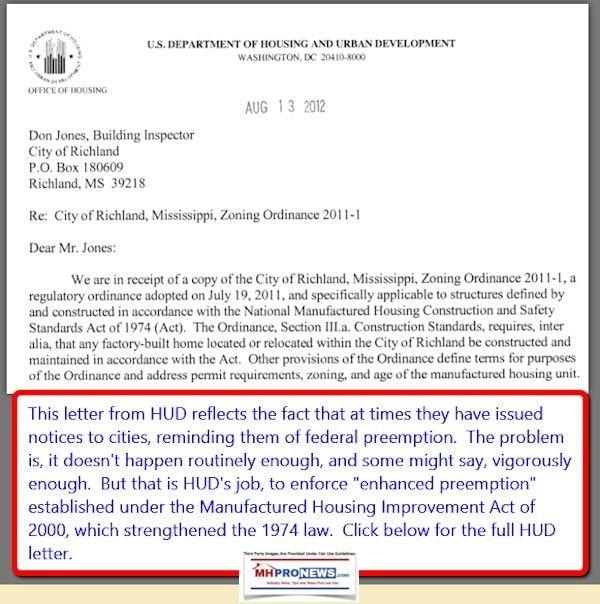
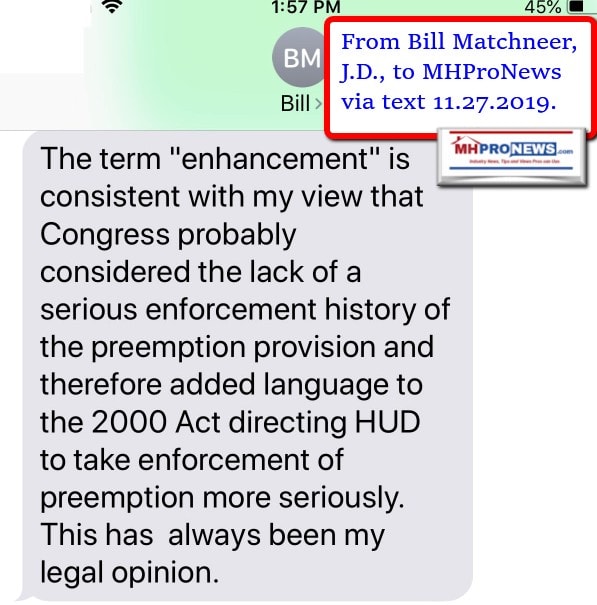
Attached are the testimony of past MHARR chairmen John Bostick and Edward Hussey, linked from their names. They include a long federal research document that is part of the regulatory and legislative background to the MHIA. The Word versions of this document have not yet been obtained as of this writing, and the PDF versions obtained where not ‘scanable’ PDFs. Those PDFs were obtained from a federal source.
Thus, the screen capture with respect to federal “enhanced preemption” segement of that testimony for MHARR is shown. Enhanced preemption is the phrase often used by MHI, MHARR, HUD and others to describe the upgrade in the original preemption language since the passage of the 2000 Reform law – is shown below.
- John Bostick for MHARR (links will be added later today, along with highlighting. The key portion on federal “enhanced preemption” is shown below.)
- Edward Hussey for MHARR.
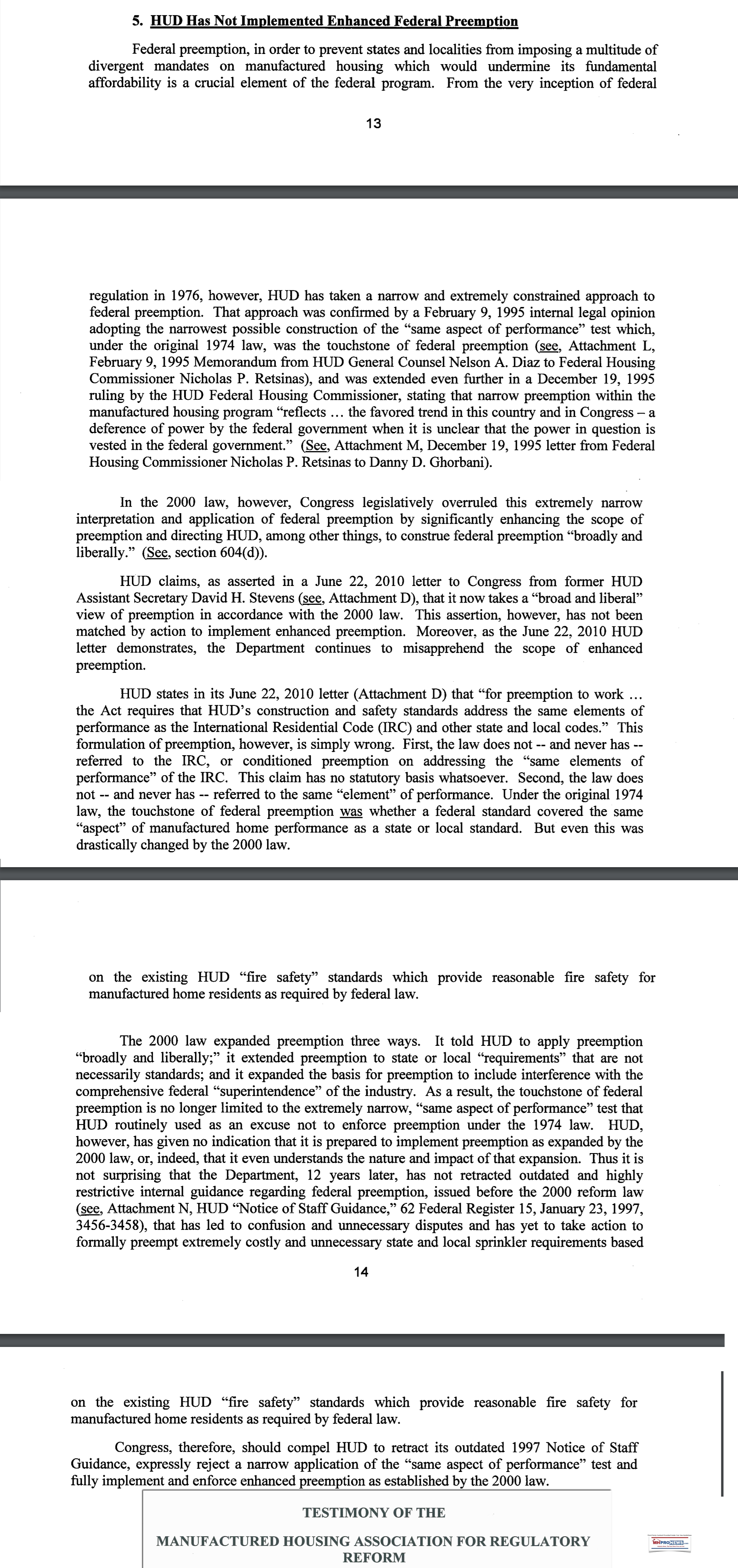
Let’s sum up to this point in the following fashion, because this report and analysis will become a historic anchoring reference for future use.
Executive Summary of this Evidence-Based Report and Analysis
- HUD Secretary Marcia Fudge denied she/HUD had authority to override local jurisdictions that create artificial barriers to HUD Code manufactured homes (see quotes and links for this and what follows from this report).
- Now former HUD Henry S. Czauski, J.D., who worked in the Office of Manufactured Housing Programs (OHMP) when he testified as shown, claimed to lawmakers that HUD was enforcing enhanced preemption.
3) Clearly, HUD’s claims summarized in 1 & 2 above are in conflict. At a minimum, it merits investigation of Fudge and OMHP’s Teresa Payne, for reasons that will be clarified herein. To the degree possible, depending on the agency, past HUD officials need to be explored too. - MHI corporate and staff leaders have claimed for years that the Manufactured Housing Improvement Act of 2000, including, but not
limited to, its “enhanced preemption” provision was not being properly enforced. - While that statement by MHI leaders appears to be true, when MHI and those corporate leaders behaviors are examined, they have not taken the logical steps to actually push HUD into compliance. For example, MHI – on this date – has no mainstream media articles, op-eds, or press releases that even use the term “enhanced preemption.” That calls into question their sincerity, given that several of their own members have been documented saying they want to consolidate the manufactured home industry. Consolidation is difficult – and certainly more costly – to
do when the industry is growing. Consolidation is far easier to accomplish, and is demonstrably occurring, precisely because the industry has been underperforming for over 2 decades. - MHARR, per sources, pressed members of Congress for the 2012 hearings that produced this testimony shown and/or linked on this page. MHARR has been consistent in its position, and is consistent in behavior. In contrast to MHI, the evidence suggests that MHARR has been consistent in behavior that matched their advocacy.
- By contrast, MHI has said one thing, but their behavior reveals another. It is breathtaking hypocrisy, and apparently illegal behavior, per Strommen’s legal research and others, which only a careful look at the evidence reveals.
- The allegations made by third-party researchers such as Samuel Strommen at Knudson Law neatly fits other claims by certain MHI members and MHI themselves are thwarting growth through a “felony” monopolistic scheme. While industry members and expert third-party researchers such as James A. Jim Schmitz Jr. et al approach the matter from a different vantagepoints, their contentions fit like puzzle pieces. The recent SEC pleadings against Cavco Industries, and two of their now former officials, also happen to fit the broader thesis that the industry has been weaponized from within by consolidators and by others. Attempts by would be-MHI surrogate defenders have routinely fallen flat. See an example linked here.
- Each fact is like a puzzle piece. These facts frame a picture that illustrates a sordid tale of costly corruption that benefits a few at great harm to many. By thwarting and skirting federal laws meant to increase public access to manufactured housing, the industry instead of growing since 2000 has shrank. But so too has homeownership in America. Check back for more links, updates, highlighting, and related on this report Tuesday afternoon, 10.5.2021.
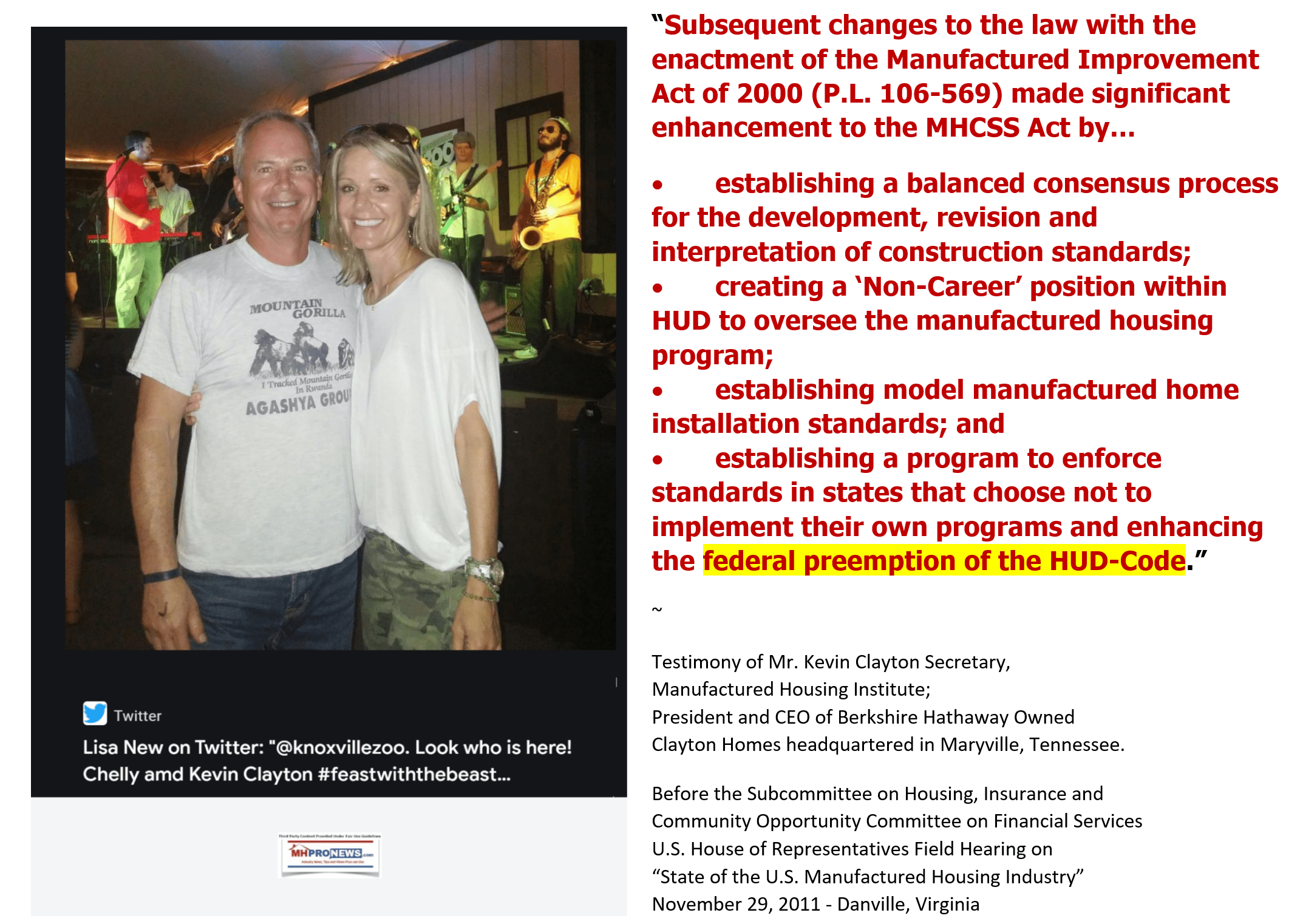
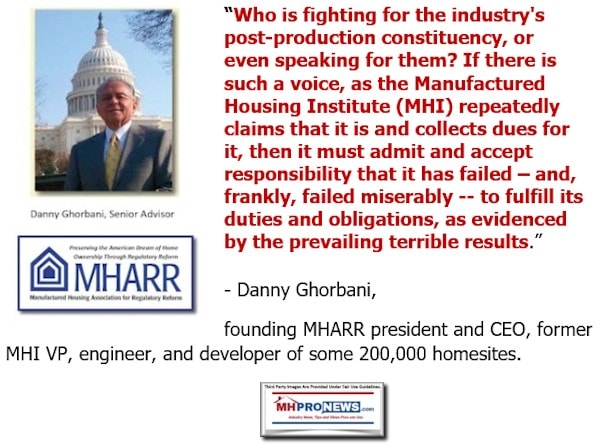
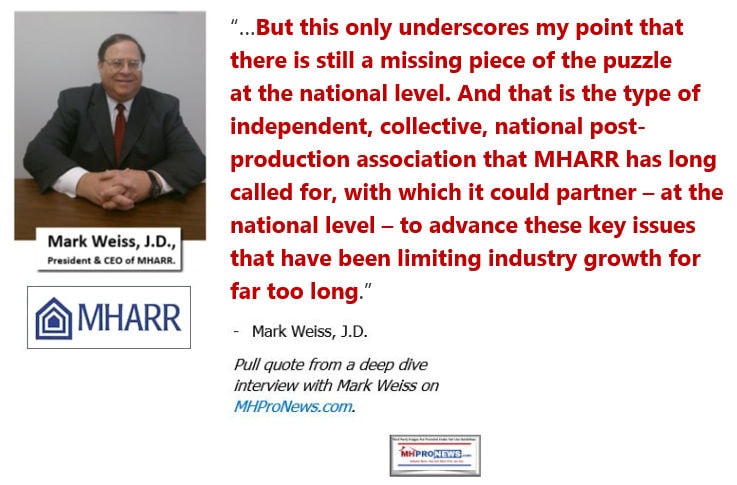
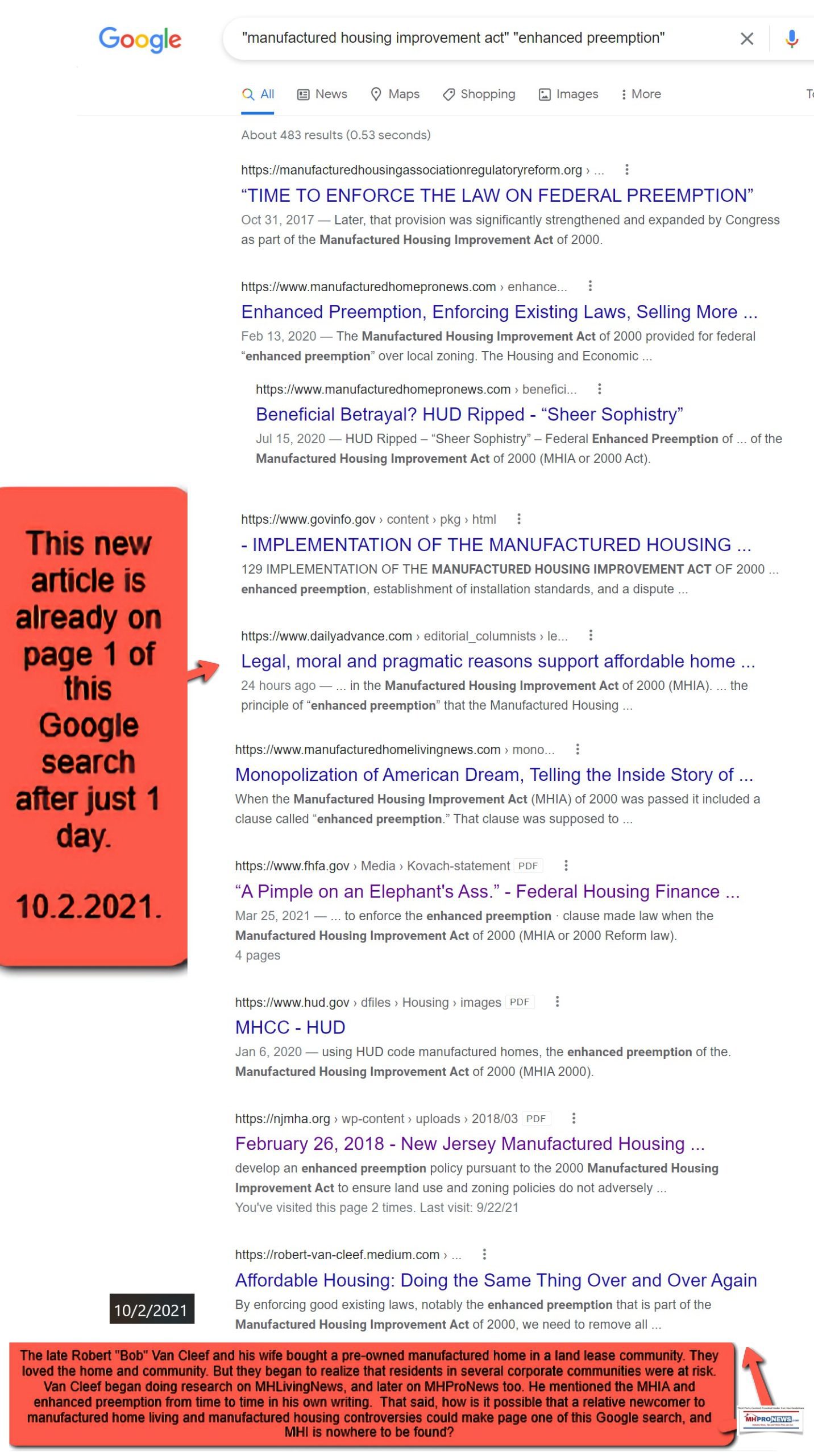
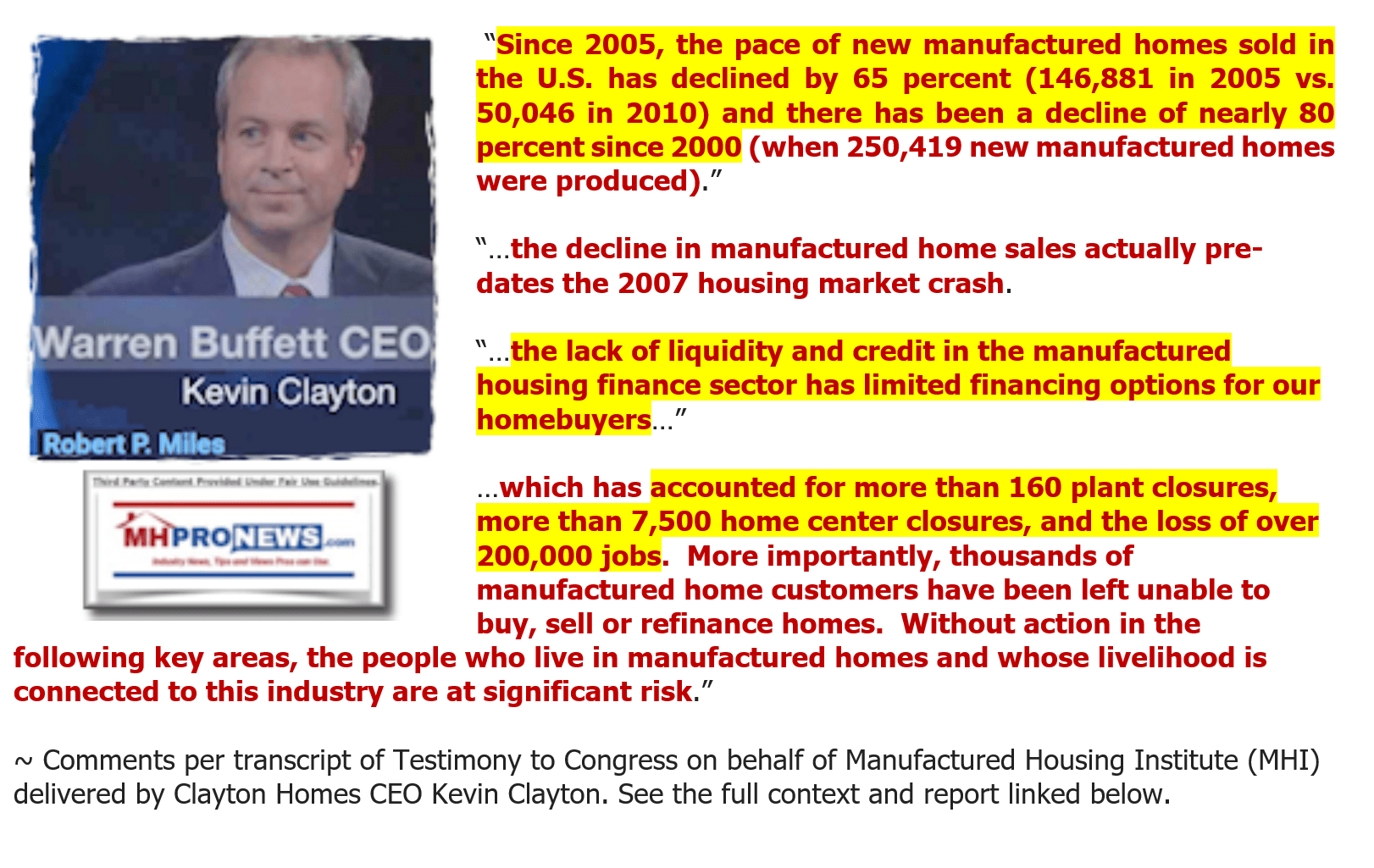
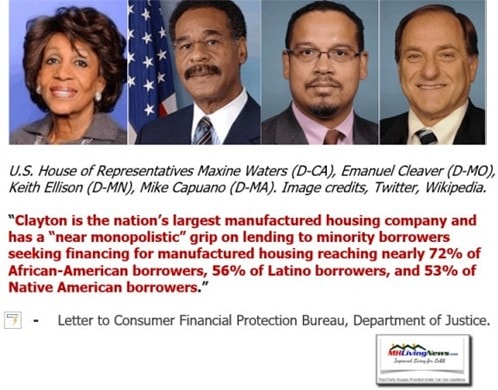
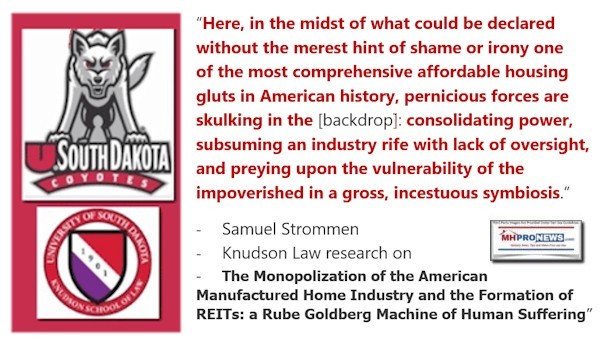
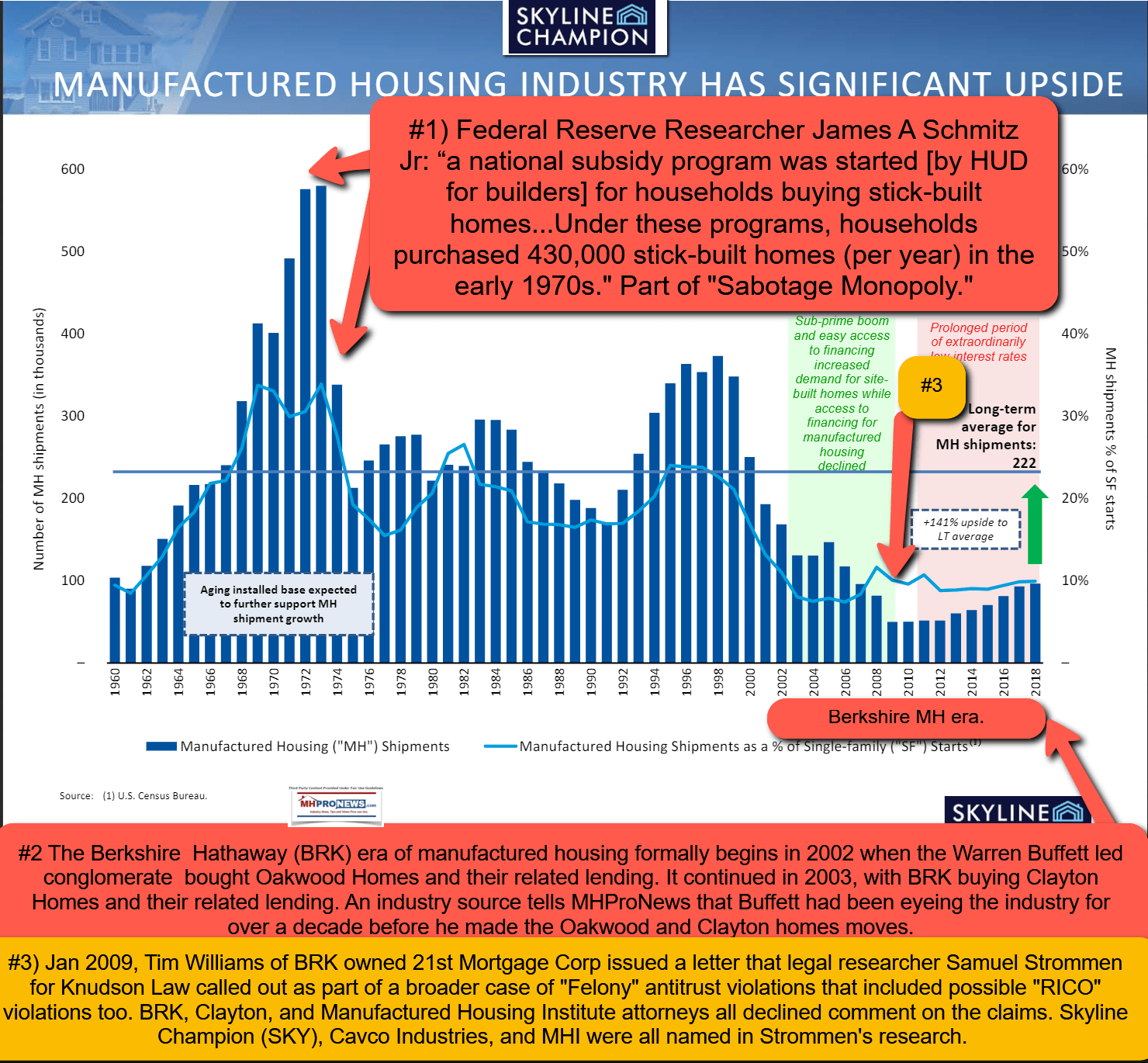
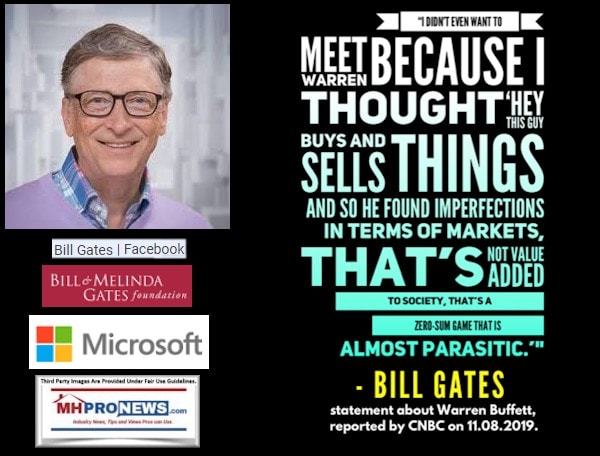
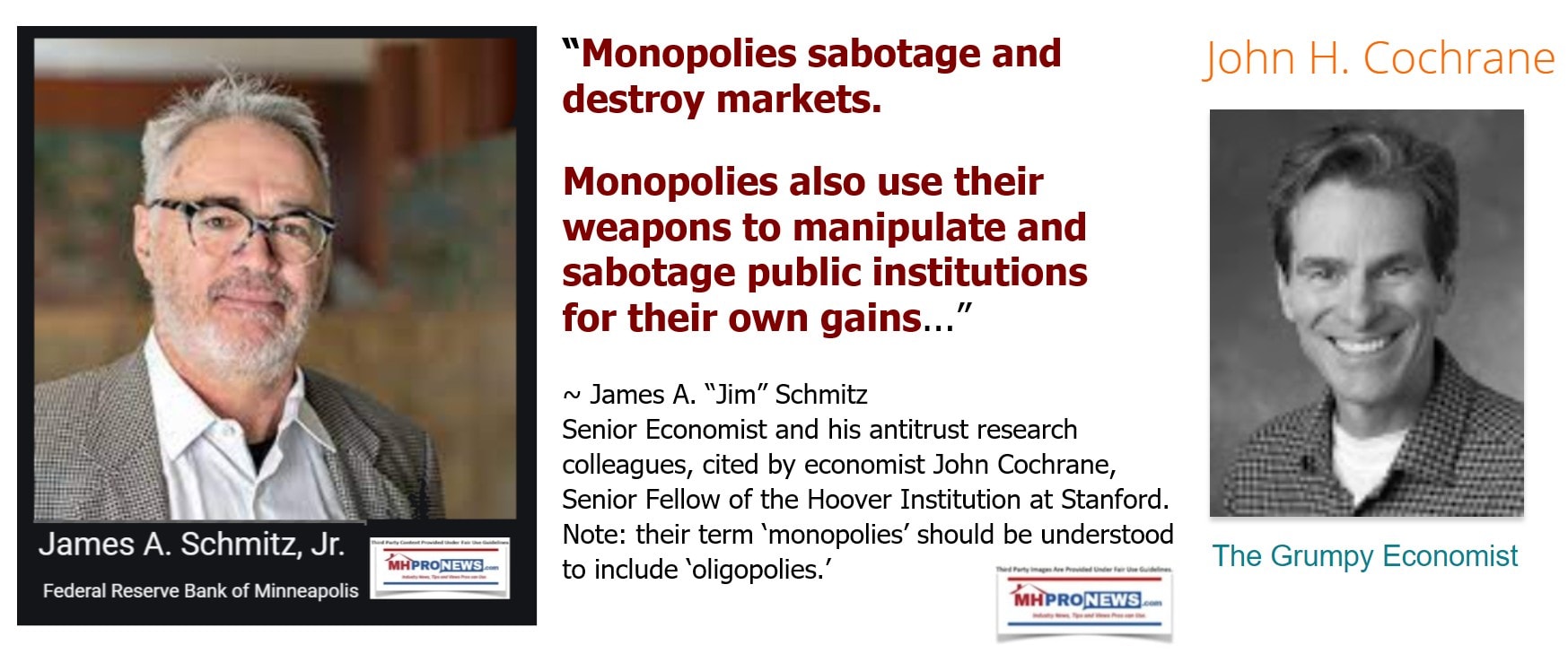
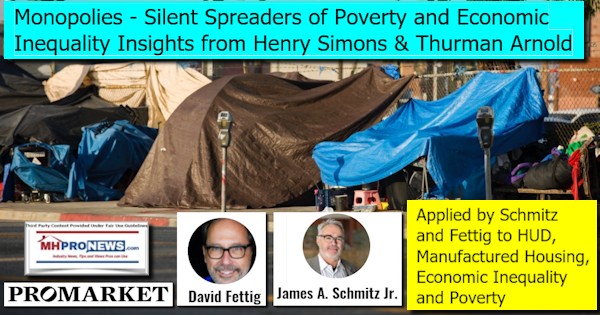
The U.S., while one of the wealthiest nations on earth, lags behinds dozens of nations in the rate of homeownership. Despite the passage of the MHIA and a rise of U.S. homeownership during the Trump-years, legislation to boost homeownership now is lower today than in 2000. Because housing is a multitrillion dollar part of the economy, it’s a massive but largely misunderstood scandal.
Additional Information and More MHProNews Commentary
One must keep in mind that MHI, during the 2018 Washington Post dust-up, failed to step up to ask for the removal of Pam Danner, J.D., from here widely viewed as destructive role as the administrator of the OMHP. Danner was said to have been ‘parachuted’ in by MHI, though on paper MHARR and MHI agreed that the better choice for the role was attorney and industry veteran, Vic DeRose.
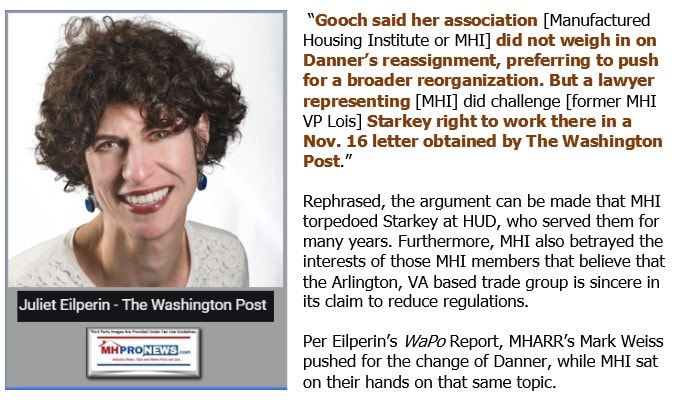
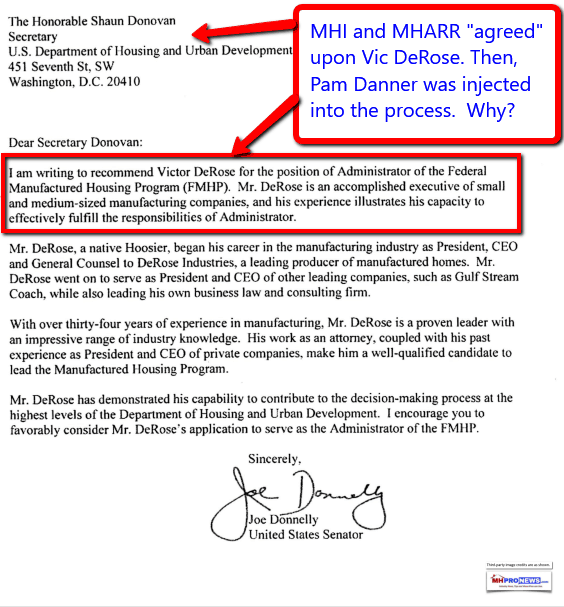
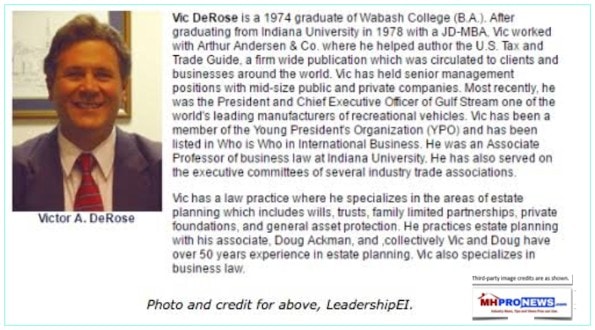
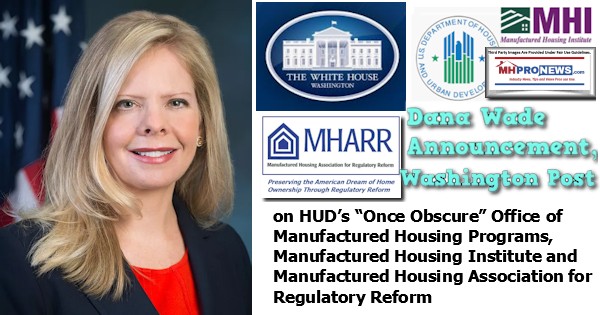
More recently, another controversy emerged with respect to the Post and MHI. Once more, MHI apparently failed to mention preemption. Perhaps as or more telling, MHI which has a budget for marketing, has had a full time PR person for years, has apparently never said to the media, or via a press release, anything about their claimed position in federal letters or testimony, such as is shown above.
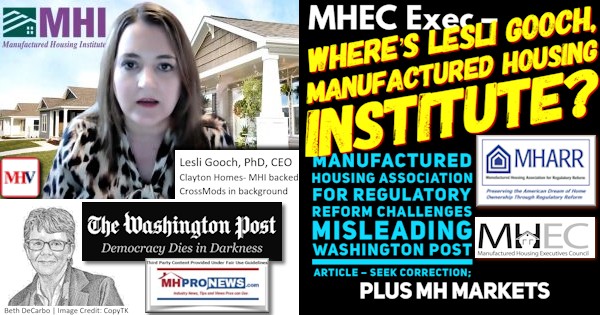
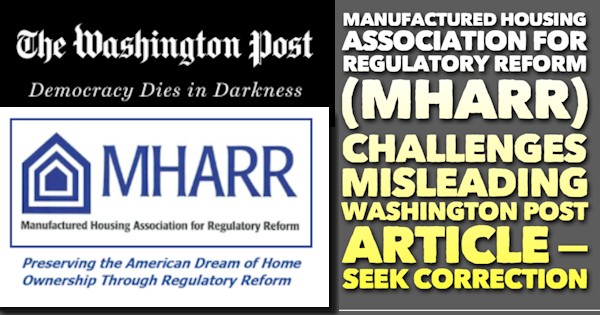
Note who has made these statements and those linked for MHI? Kevin Clayton, Tom Hodges, and Manny Santana are all on record saying very similar or often the same things. The first two work for Berkshire Hathaway owned Clayton Homes. Santana works for MHI member Cavco. In a different setting during the Trump Administration, Mark Yost, president and CEO of Skyline-Champion (SKY) made statements on behalf of MHI. Three of the big three leaders are on record singing from similar or the same sheet music.
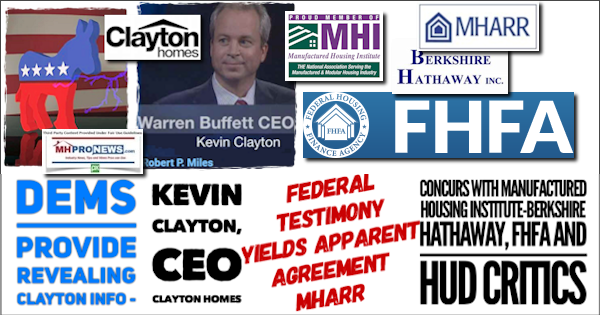
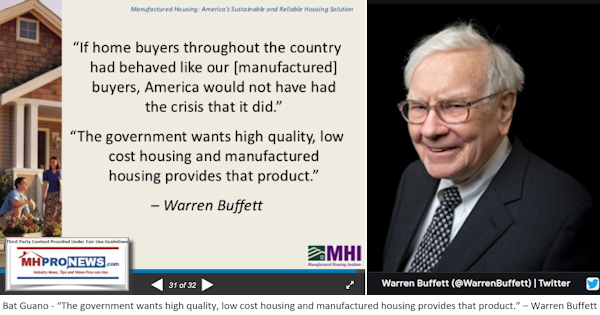
Years later, with the nuanced difference of the Clayton-and the other “Big 3” back promotion by MHI of CrossMods, MHI CEO Lesli Gooch said some key things that double down on statements by Clayton, Hodges, Santana on enhanced preemption. But among the reasons that Gooch and other comments on CrossMods must be noted is that the plan has been an obvious problem for the industry at large, if industry growth was MHI’s authentic goal. If so, years of evidence proves that they can say the right things, but routinely have failed to DO the right things.

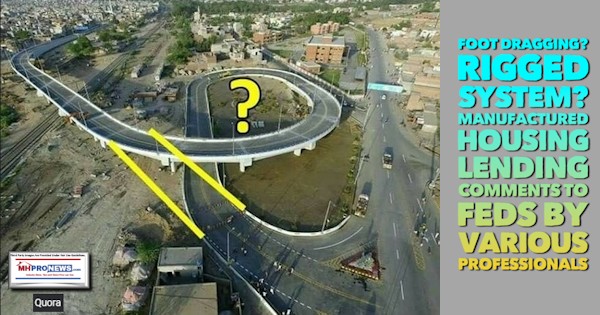
But keep in mind, even if MHI fails, HUD still has the responsibility to follow the law. More on that in a planned follow up.
The fact that there was 2½ years of modestly declining sales during an affordable housing following the CrossMod ‘promotion’ – and given the failure to properly implement the MHIA 2000, speaks for itself.
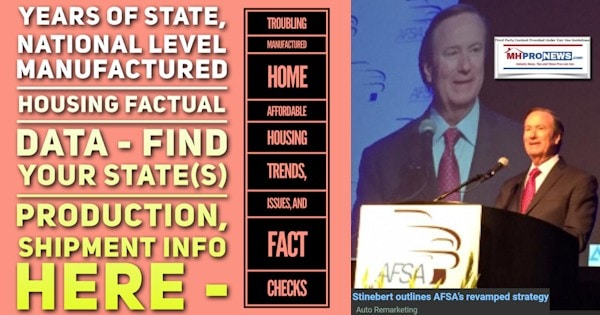
Based on hard factual evidence, the MHI branded and pushed CrossModTM scheme has not benefitted industry growth. This involves the Government Sponsored Enterprises (GSEs) of Fannie Mae and Freddie Mac. MHProNews correctly projected some 3 years ago that this scheme would be a Trojan Horse for the industry.
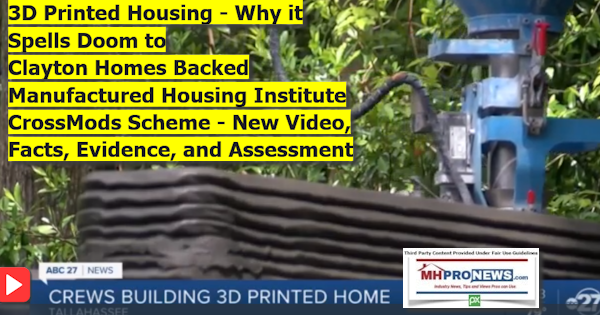
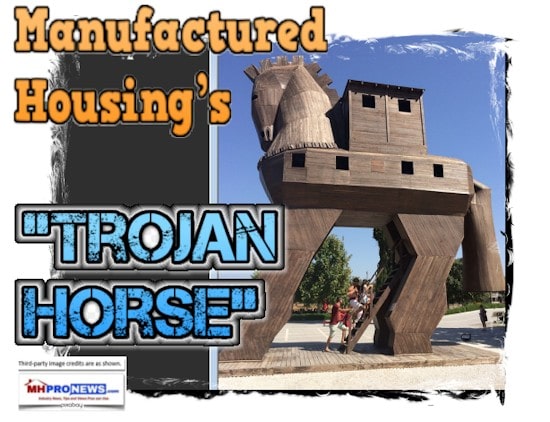
If we as trade publishers, albeit as industry experts, could see that coming, and other MHI and other sources said on or off the record that they disagreed with the plan from its announcement, then why did MHI do this in the first place? More to the point, when the plan demonstrably failed to get traction as their so-called research claimed, why has MHI continued to press it?
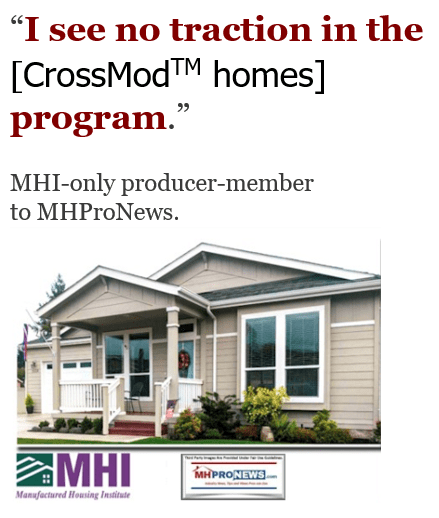
CrossMods was apparently flawed from it’s birthing. The evidence strongly suggests it was a blatant scheme that points to MHI corruption to thwart good laws that they claim to be supporting. See that linked below.
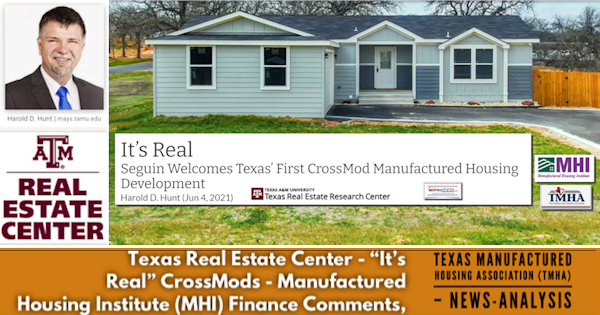
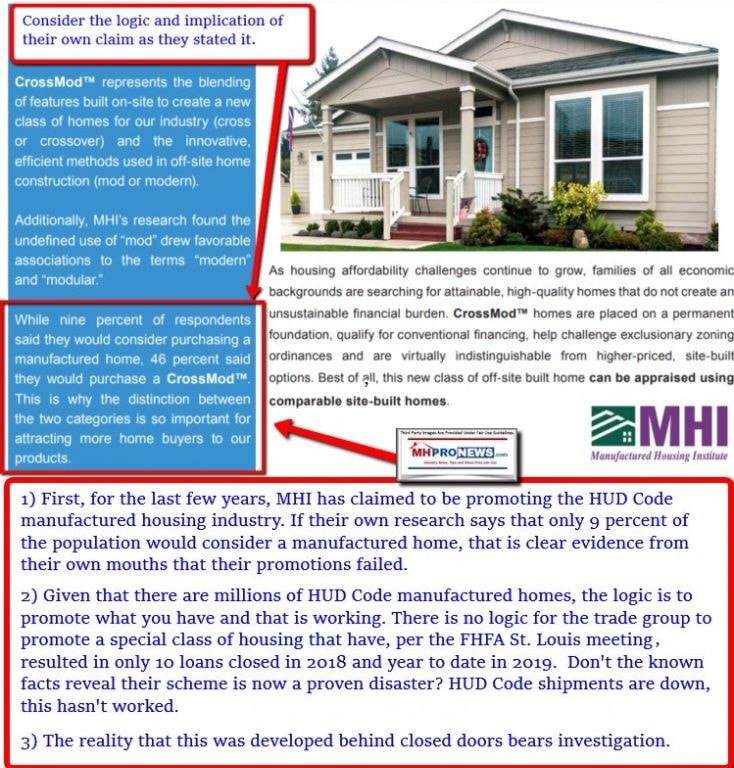
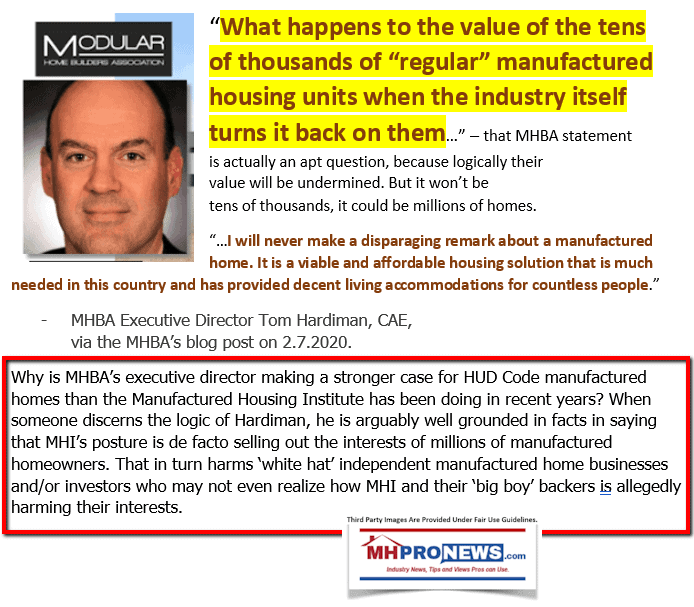
That may not be enough to get them charged for lying to Congress, because their statements were not lies. However, their claimed desire to see these laws implemented is in question. There is an array of evidence that shows that they did not want these laws, at least not during the rising influence of Clayton during the Berkshire era of the industry, to be implemented. Instead, what they and others slyly sought was consolidation.

If there were no direct evidence for that, what appears here might be interesting, but might not convince some. But there is direct evidence, and it comes from MHI members that are publicly traded firms!
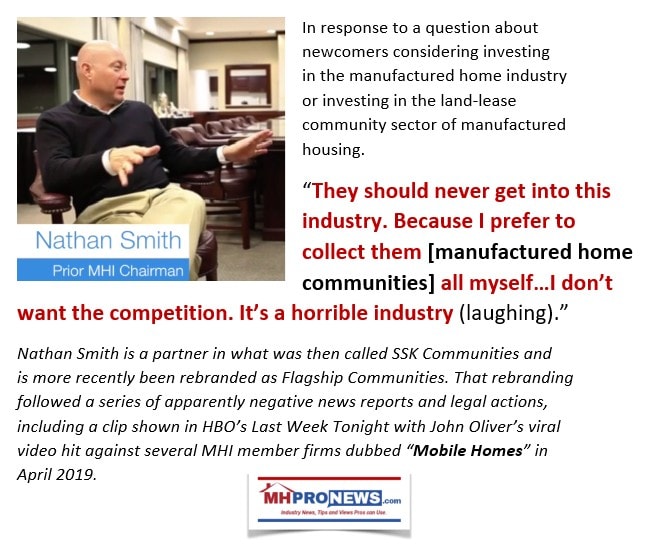
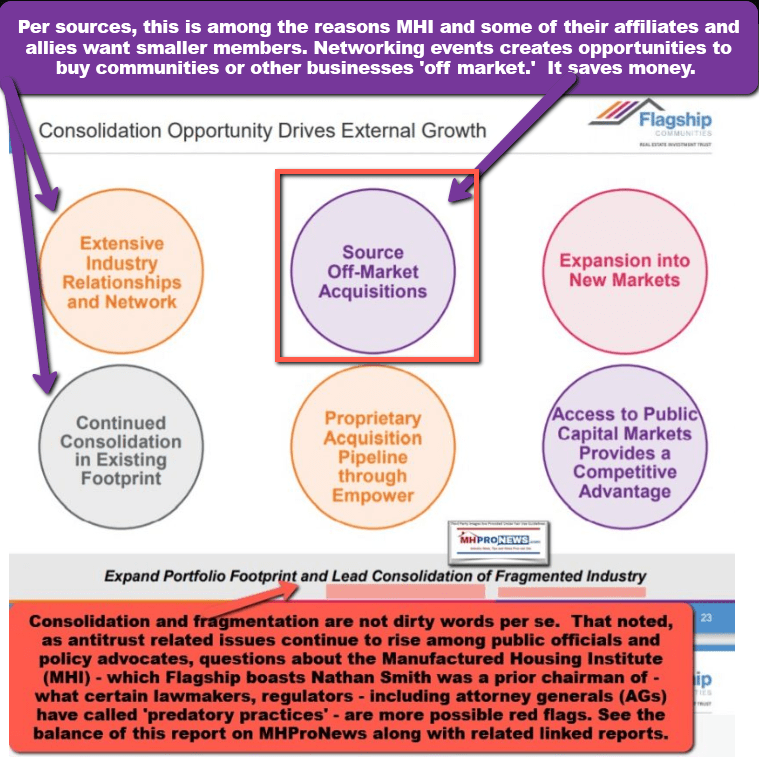
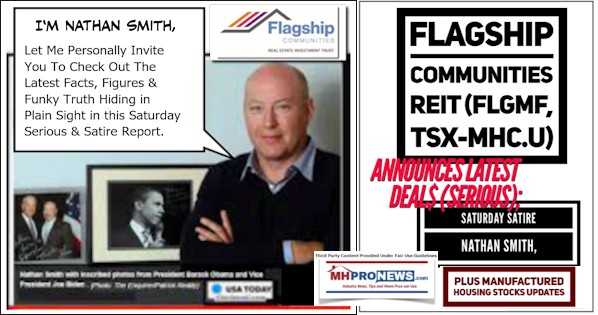
Some of these firms have a history of problematic behavior. Think MHI members such as Havenpark, RHP, Flagship, Cavco, etc.
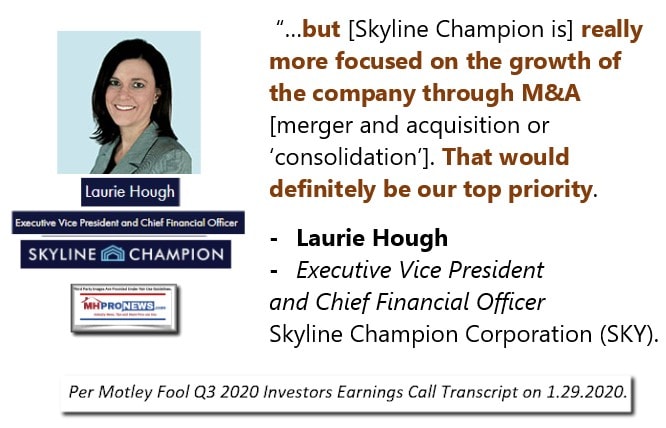
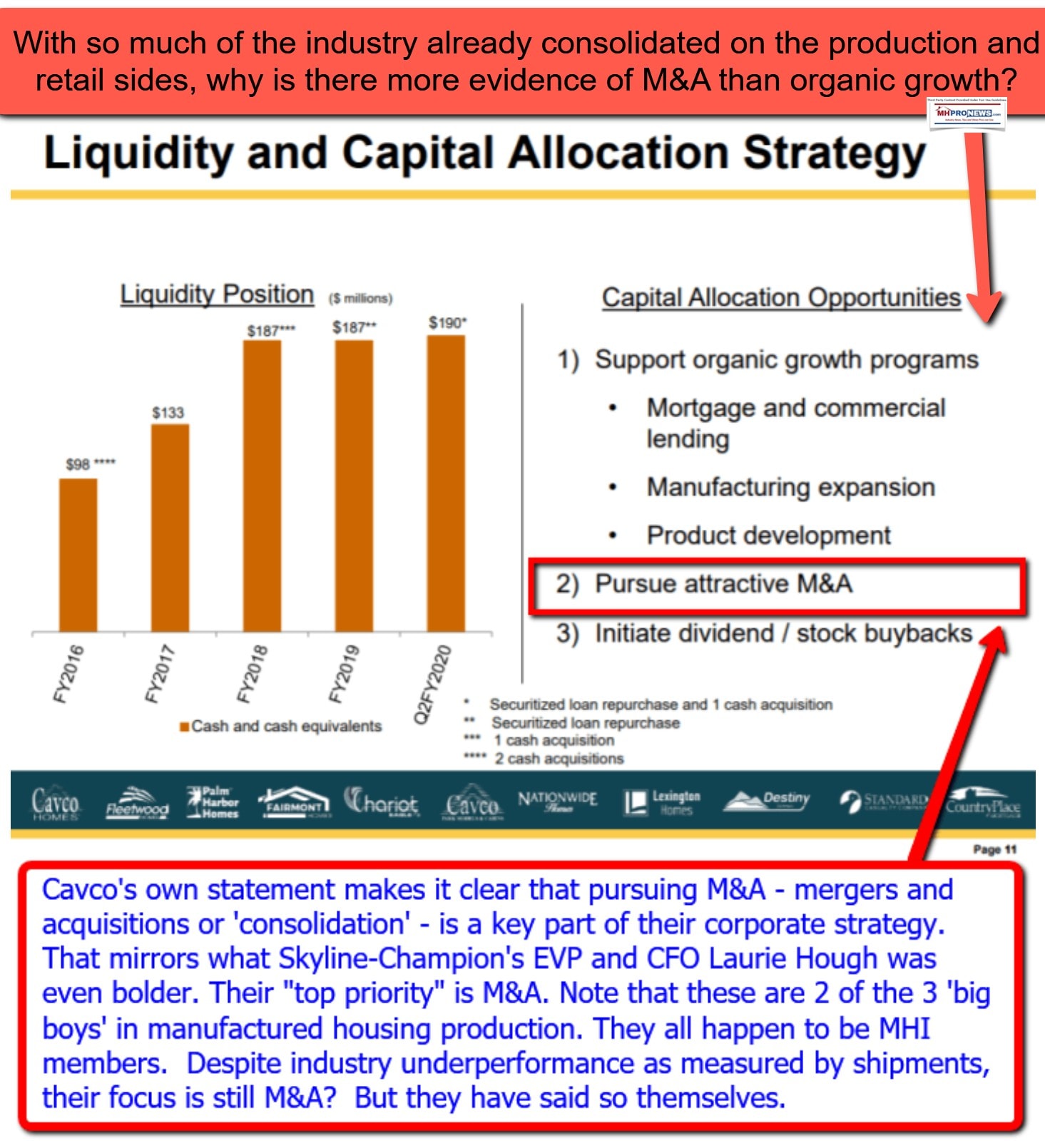
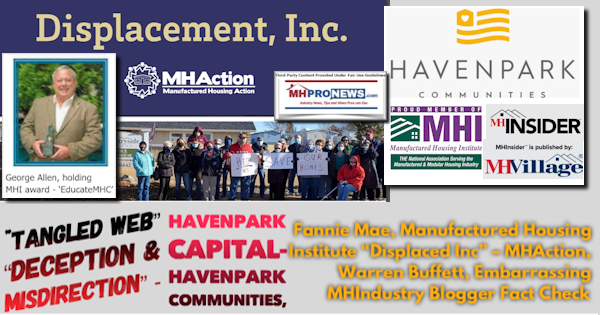
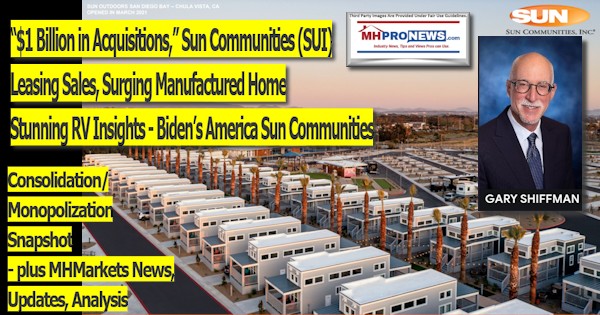
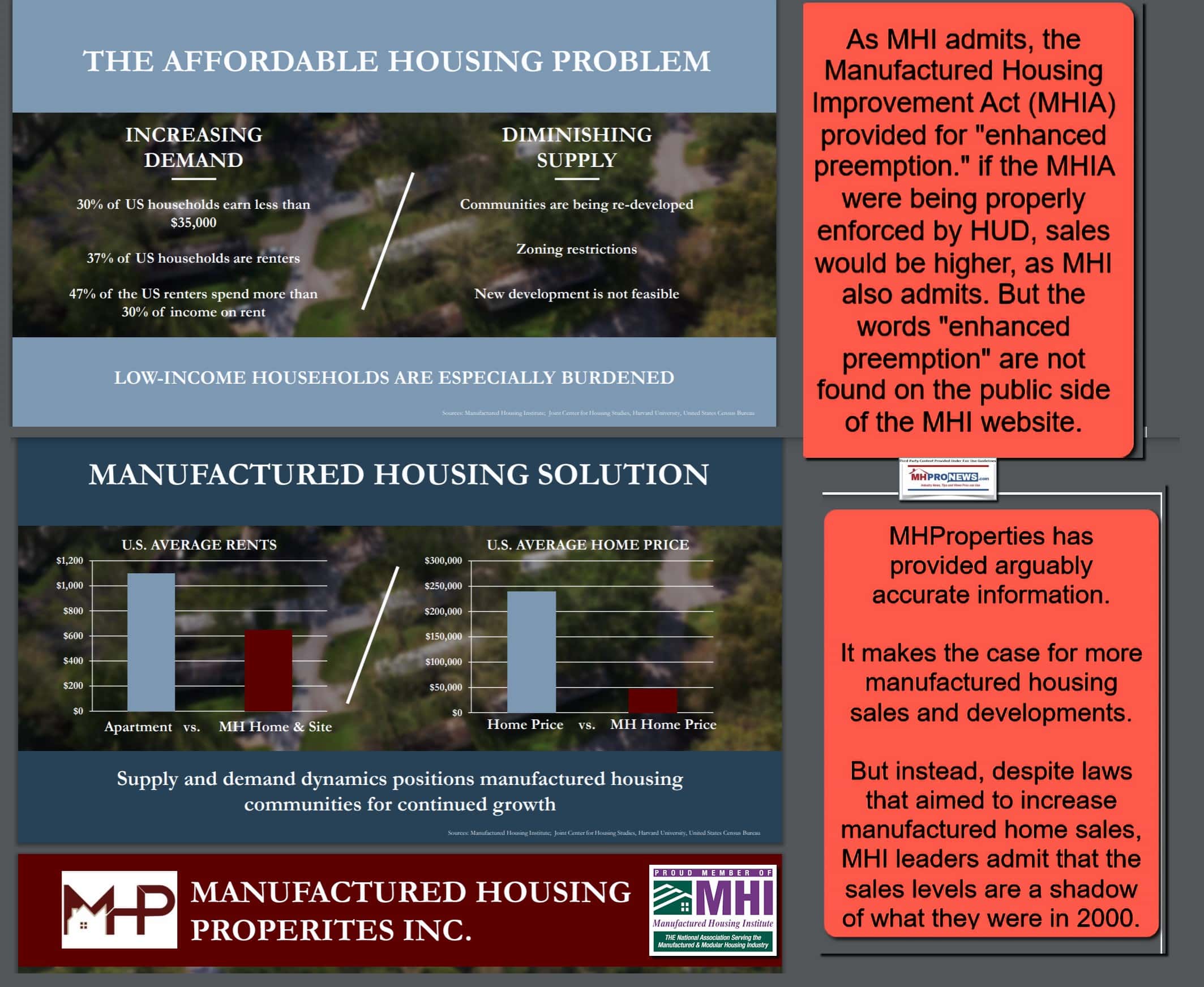
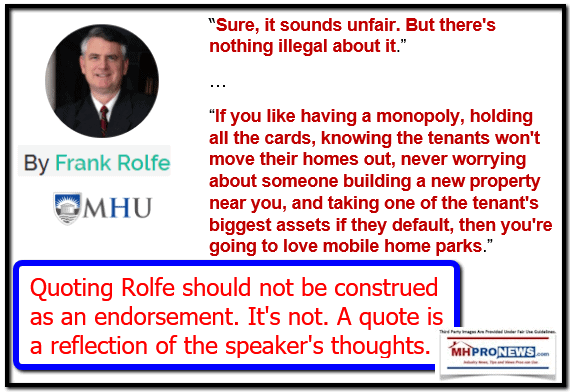
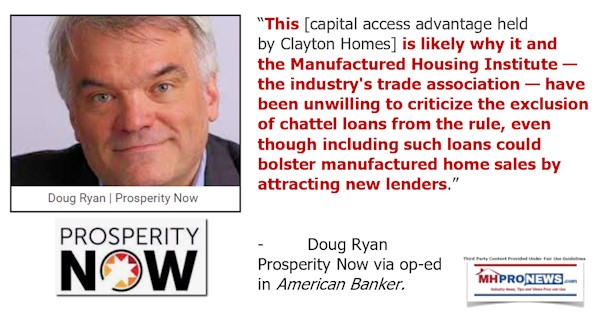
It has been said that in Washington, D.C., there are no coincidences. That and ‘follow the money trail’ are how to discern what is actually occurring versus this or that organization or person’s talking points.
The only beneficiary of the roughly 2 decades in delay in implementing enhanced preemption has been to manufactured housing industry rivals, and to manufactured housing industry consolidators. Millions of renters, current manufactured home owners, taxpayers, and others have each been logically harmed.
Additionally, MHI is openly in league with ‘housing’ nonprofit advocates that are demonstrably in competition to manufactured housing.
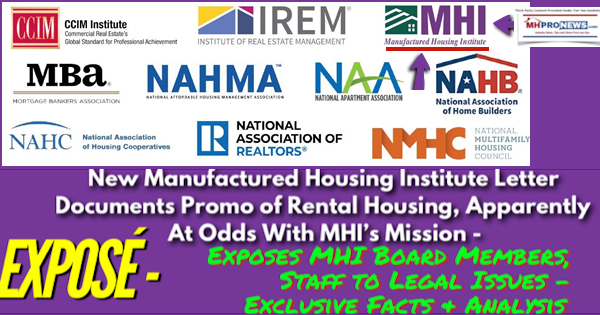
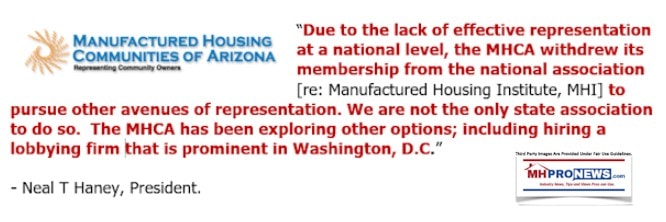
As FHFA officials recently told MHProNews, CrossMods have barely registered a tiny fraction of a single percent of all manufactured housing production. It was and is illogical at best, or an illegal con job at worst.
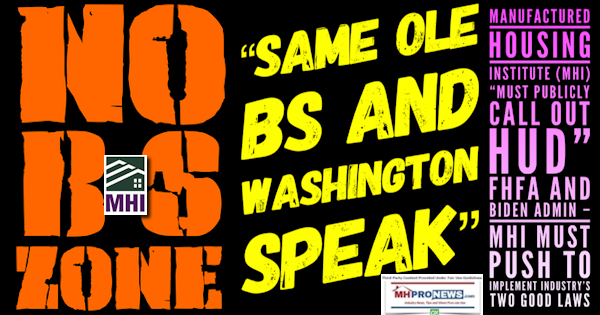
Rephrasing, MHI – on paper – supports the notions that MHARR has consistently and demonstrably authentically pushed.
However, years of MHI photo ops and videos have demonstrated their repeated access to HUD, the White House, and Congressional leadership, among other federal officials. By contrast, MHARR with its smaller budget has had very limited such contacts during the same time frame.
The Biden campaign website observation that access is a form of capital in Washington is quite correct. How did MHI use that capital?
- Why was there no similar question put to Dr. Carson that mirrored the question posed to Secretary Fudge?
- Why did Secretary Fudge carefully worded response duck what the first office of OHMP director, Bill Matchneer, said was his consistent view of the MHIA law?
- Why didn’t MHI swiftly protest that wording by Fudge?
- Why did MHI instead fail to mention that entirely to MHI’s members and would be members?
While MHI can show words on paper that seem to posture benefit for the industry’s independents, several publicly traded companies that are MHI members have made clear statements that they favor consolidation of the industry.
Meaning, several of MHI’s own members, as well as the behavior patterns, all routinely point in one direction. That direction is that MHI has apparently done what Sam Strommen accused them of in his legal research.
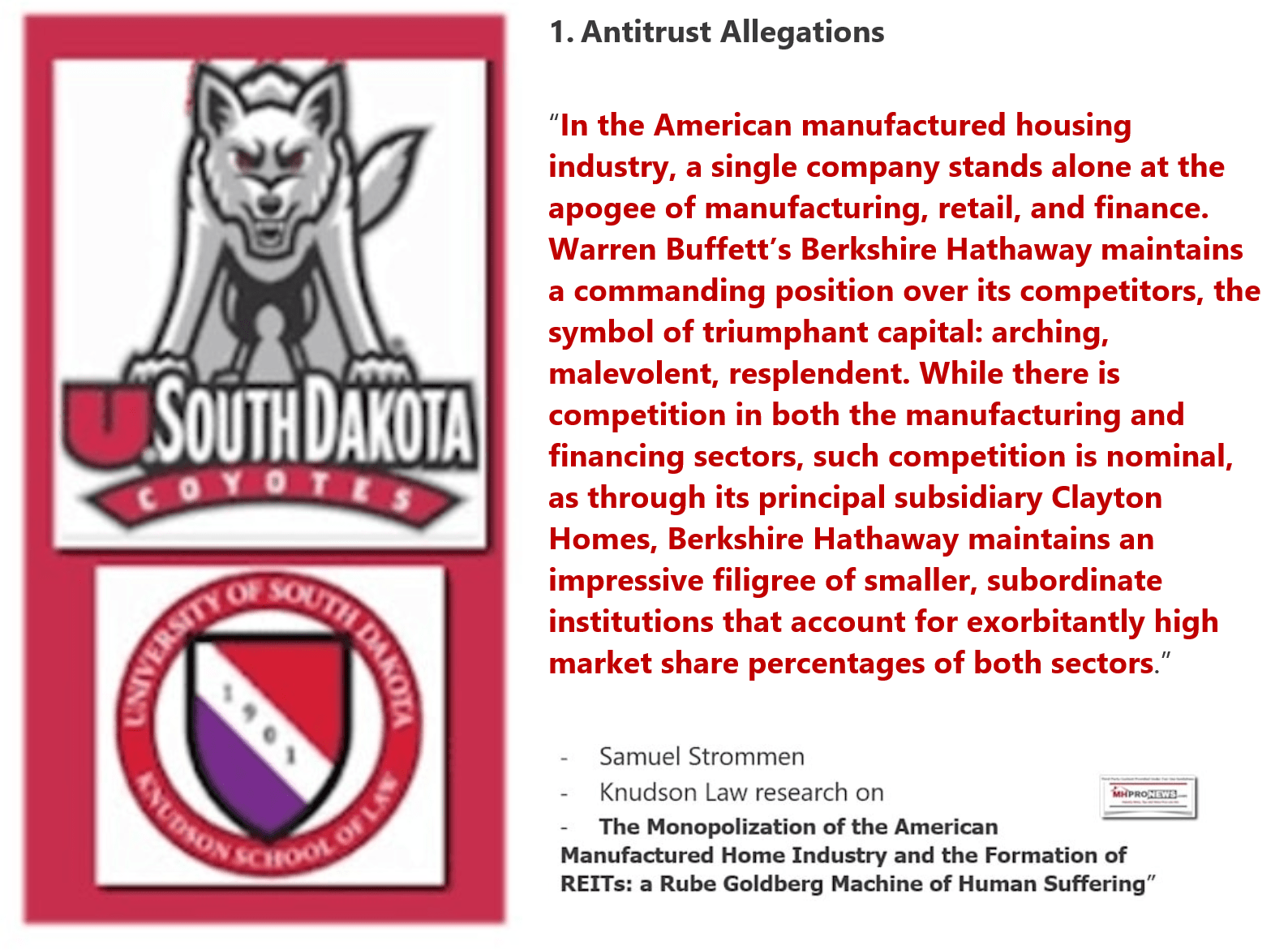
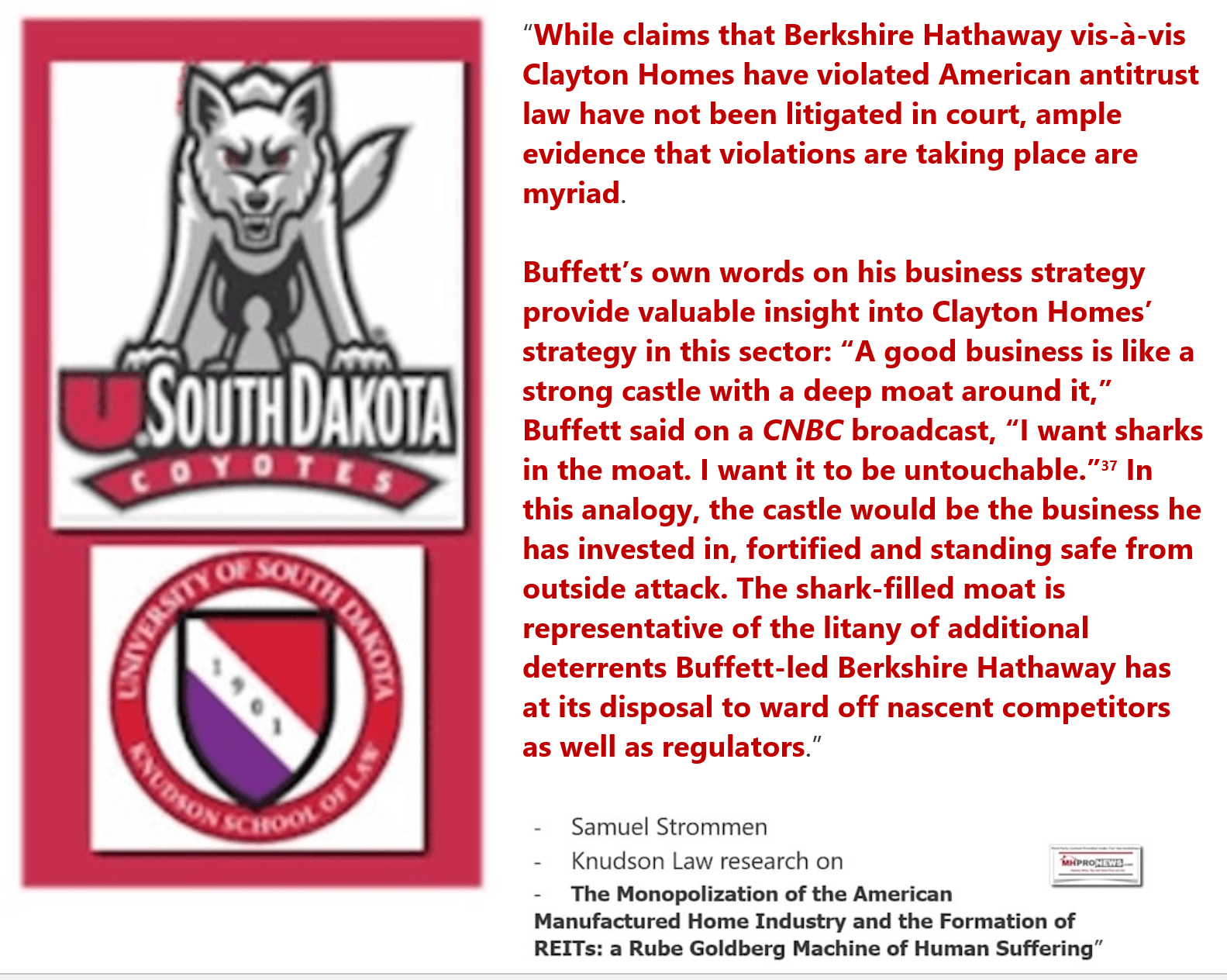
After publishing that initial report and analysis, Berkshire Hathaway corporate and legal officials, Clayton, MHI and their outside attorneys were provided an opportunity to respond or debunk the premise advanced by Strommen. They declined on several occasions.
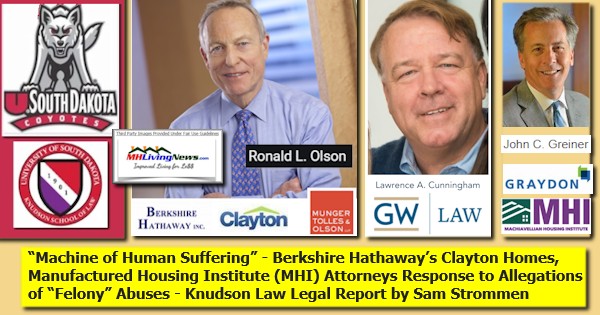
Among the repeated opportunities to clarify or even deny the charges against them, where in public meeting settings. MHI and their corporate leaders ducked and dodged publicly too.
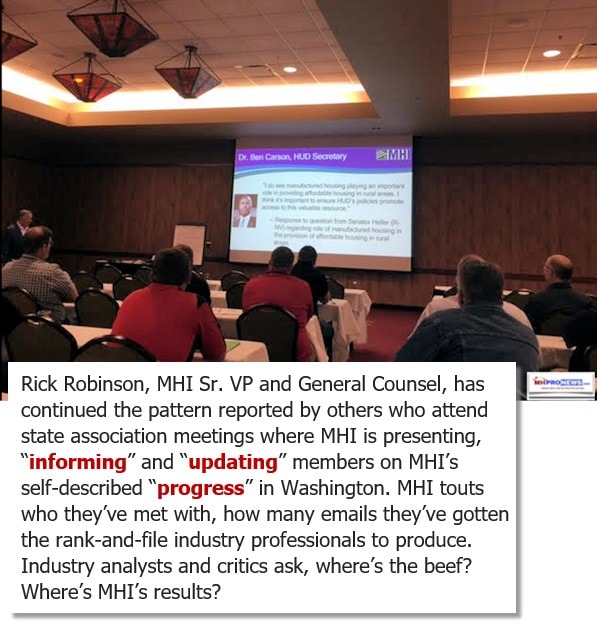
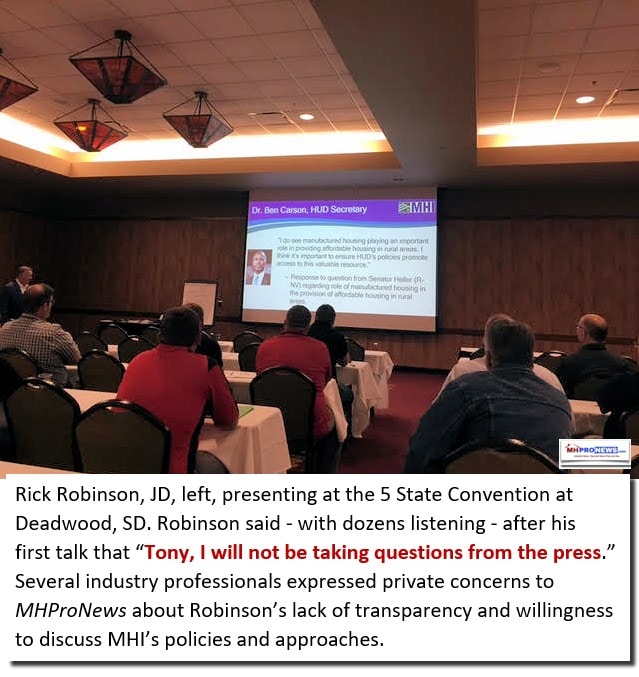
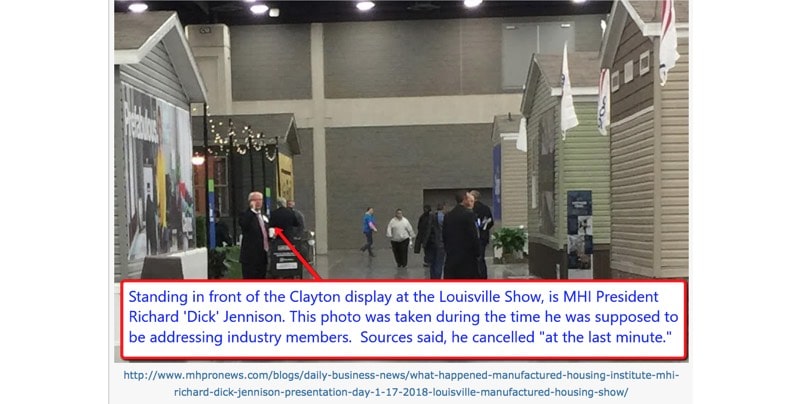
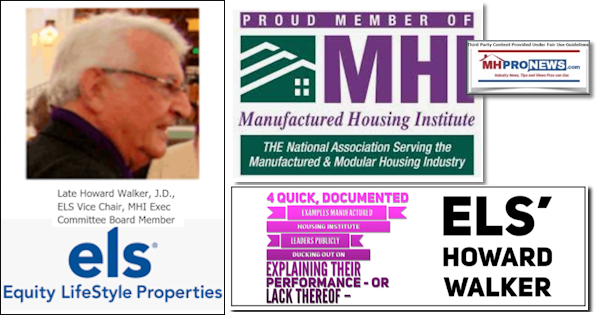
The only reasonably earnest debate on these issues has been by MHI member Andy Gedo. But when the smoke cleared, Gedo made several useful admission that mirrored the Kevin Clayton ‘castle and moat’ premise. Kevin Clayton himself said on camera that they planned to make it hard on the industry.
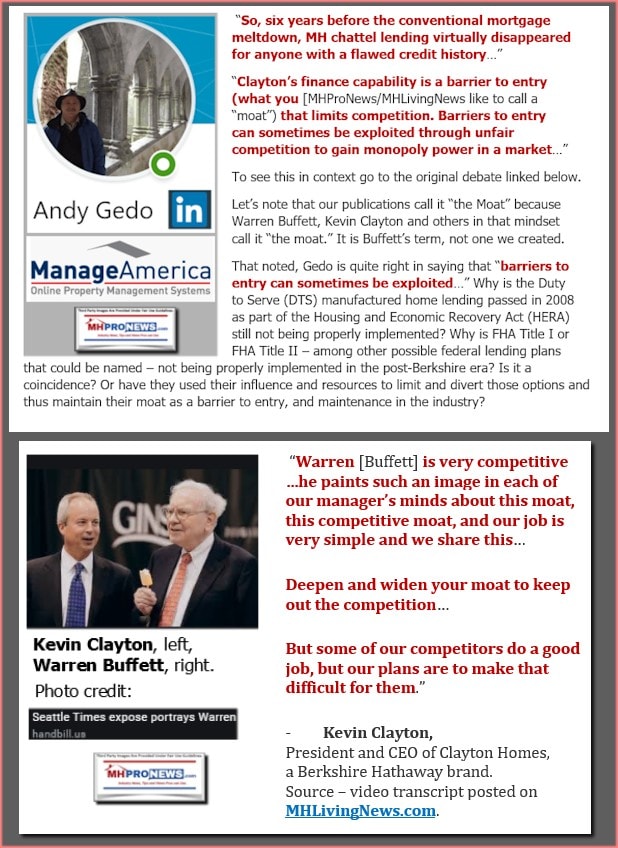
Certainly, the loss of 7,500+ retail centers is plenty. But that number could be double that, perhaps more, depending on the source. Pro-MHI member Ken Corbin said that the loss of retail centers was at least 10,000. Some put the total number of lost retailers at closer to 20,000.
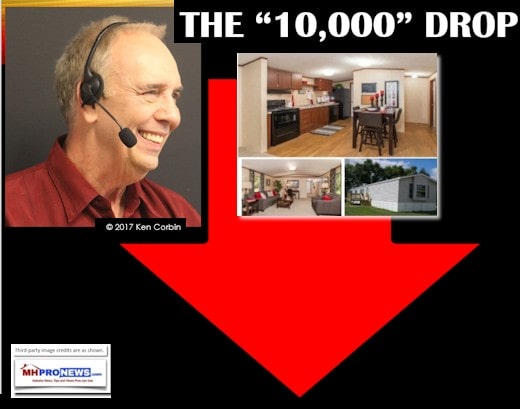
But in hindsight, even the number of Clayton Homes owned retail centers has dropped somewhat. That drop is despite the fact that Clayton has acquired several independent retailers in various U.S. markets.
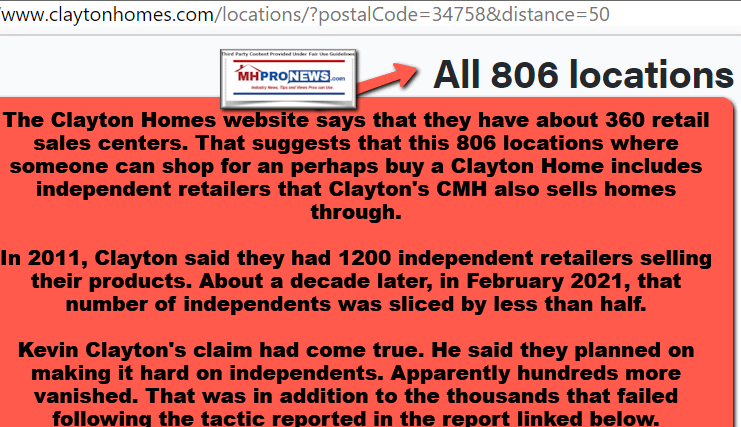
What no one for MHI said in their testimony, and what MHARR may not have thought to point out or realize at that time, is this. That the fall of the manufactured housing industry from its last peak in 1998 to its 2009-2010 lows was due in significant measure because of a letter that cut off of financing to non-Clayton retailers by 21st Mortgage Corp.
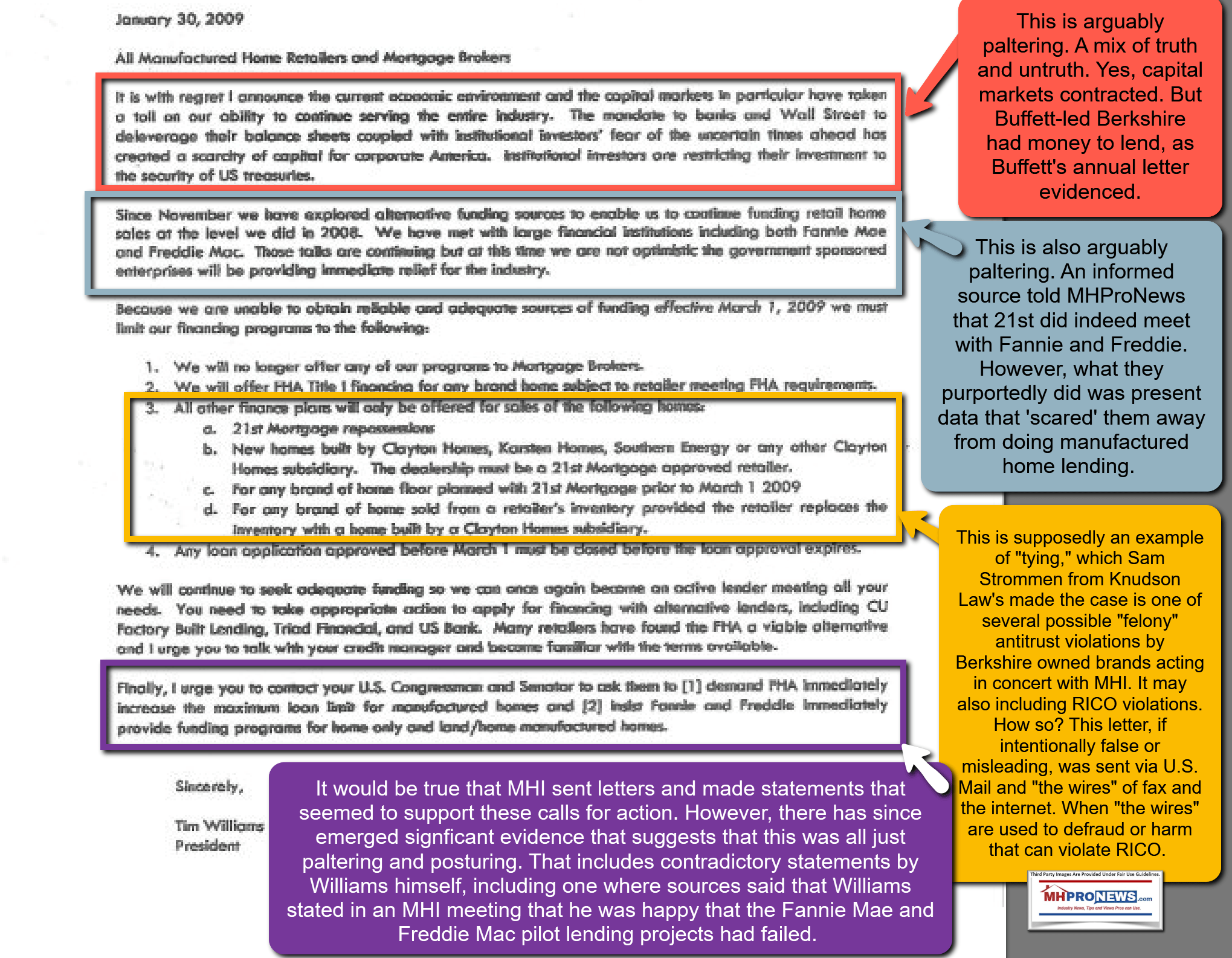
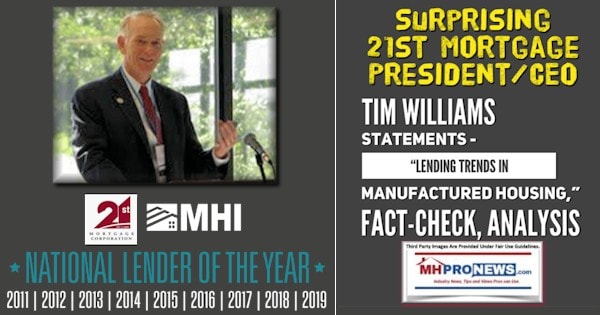
Ironically, Kevin Clayton has obliquely admitted as much, when Clayton said a lack of financing has harmed the industry. What he didn’t say is that this has long been the plan. Who says? Warren Buffett and pro-Buffett author/researchers.

Strommen said this 21st ploy, which was made under false pretenses contradicted by both Warren Buffett and Kevin Clayton, was apparent evidence of tying, an antitrust violation. But there is obvious evidence, that is not yet controverted publicly by MHI’s leaders, that they have “sabotaged” the market, which is the language used by Minneapolis Federal Reserve researchers. See those claims and reports linked above.
If this were not enough, several reports by mainstream media have made Moat-specific and related comments.
The Nation, Forbes, Seattle Times, Financial Times, GuruFocus, and The Jacksonville Florida Times Union are among mainstream media that examined predatory practices including evidence-based allegations of Warren Buffett’s monopolistic “moat” methodology.

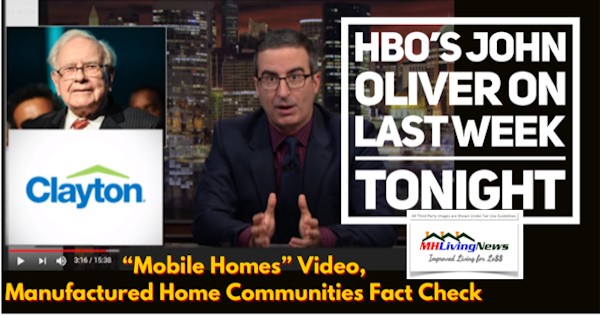
There is thus ample evidence for federal and other investigators to open a probe.
But before going into court, it is good to know what the opposition is likely to say or claim. MHI could say, but we’ve been talking about the good things about the industry for years. We’ve been meeting with public officials and making presentations like the one below for years. Perhaps, but what is missing for this roughly decade old MHI PowerPoint? Consider that this was presented at around the same time as Santana and Clayton’s comments to Congress. While it is an interesting presentation, and has lots of facts, it is missing some key words. Namely, there is no mention of the Manufactured Housing Improvement Act of 2000 and “enhanced preemption.” If that MHI VP had made the same presentation, and capped it off by saying this is federal law, share this with your constituents so they will accept it, perhaps thousands to hundreds of thousands of more manufactured homes would have been sold.
No Title
No Description
That such a probe has not yet occurred, given that MHARR is on record asking for this, is disgraceful or even more evidence of corruption at the federal level.
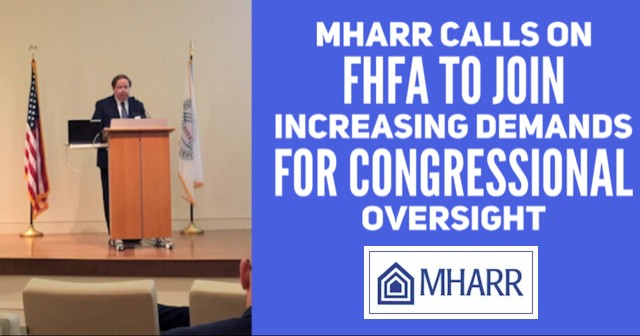
Closing Thoughts, Summary, and Conclusions
Whatever the reasons some may wish to advance for this tragic pattern, Schmitz and company are correct in saying that a lack of manufactured housing directly contributes to a series of harms to the low-, lower- and middle-class. The lack of manufactured homes contributes to homelessness, they have said. Others are on record with similar concerns.
Thus, failure by federal officials, corporate and nonprofit board members, and others to do an authentic investigation of those corporate, government, and nonprofit leaders involved would only make a very problematic looking scenario appear even worse.
Additionally, it means that people like the Tafts, and untold others like them, are being denied their part of the American dream.

This status quo must not be allowed to stand. Those who have made this treacherous “Iron Triangle” of behavior occur must be subpoenaed, along with relevant documents. They must be questioned under oath. This should occur in public settings with the transparency that Biden pledged would occur.
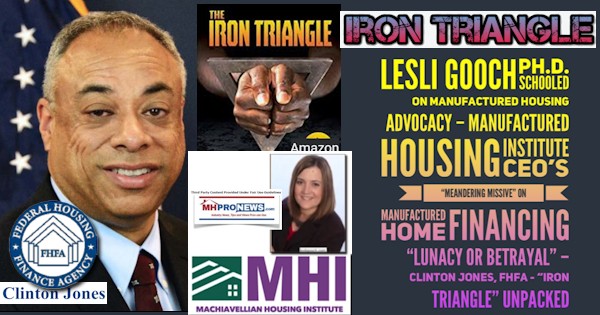
The fight for the American Dream for people of all backgrounds is just warming up. Stay tuned for what’s next, because there are good reasons to believe that a noteworthy shoe is – finally – about to drop. ###
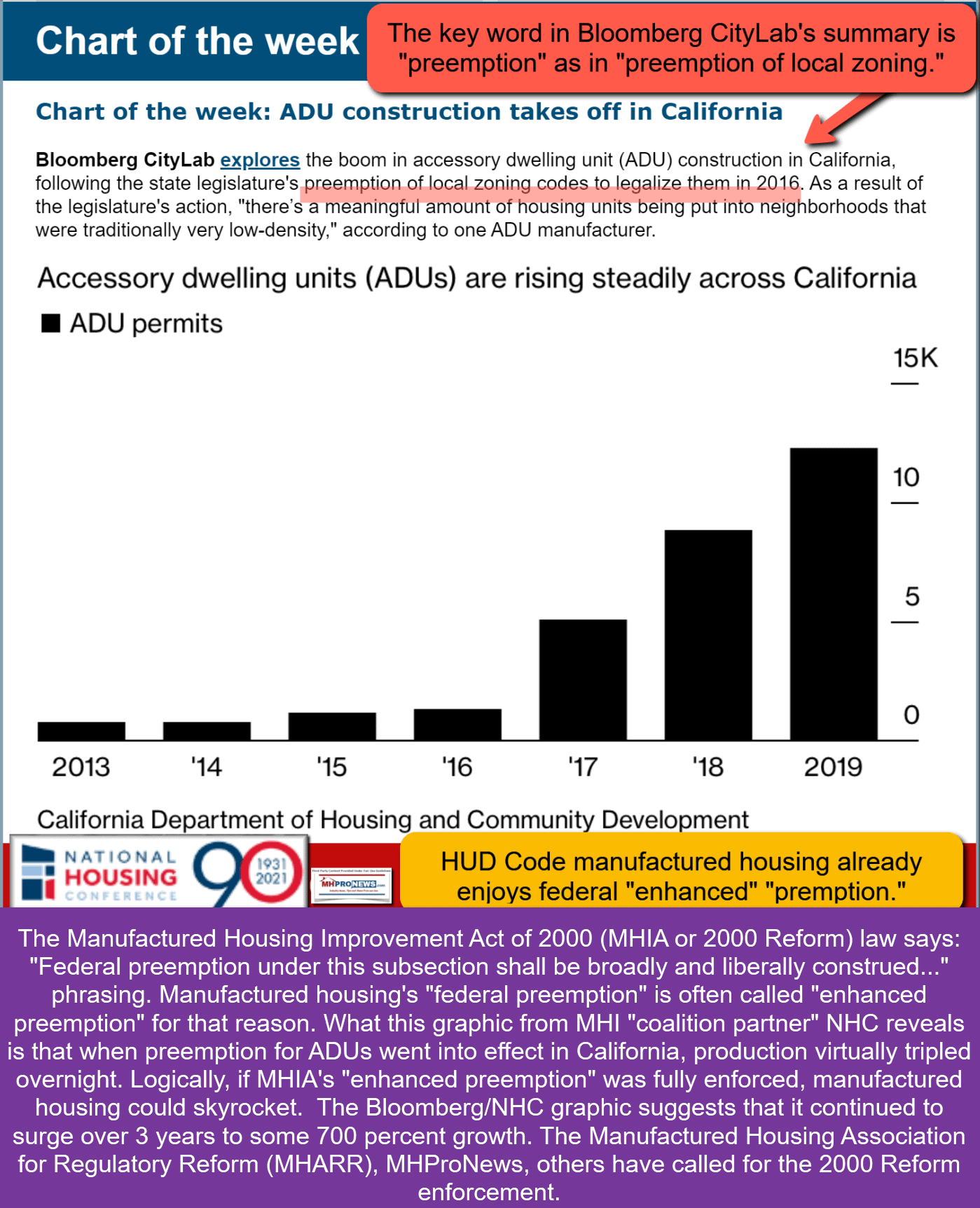
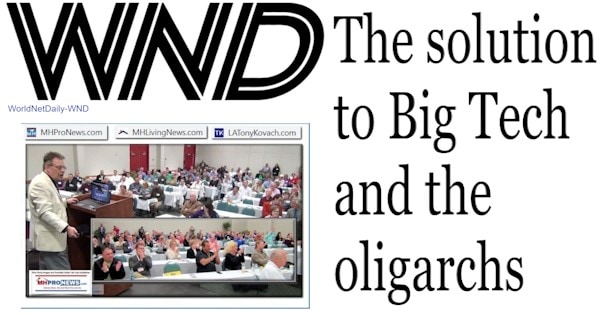
[cp_popup display=”inline” style_id=”139941″ step_id = “1”][/cp_popup]
Stay tuned for more of what is ‘behind the curtains’ as well as what is obvious and in your face reporting that are not found anywhere else in MHVille. It is all here, which may explain why this is the runaway largest and most-read source for authentic manufactured home “News through the lens of manufactured homes and factory-built housing” © where “We Provide, You Decide.” © ## (Affordable housing, manufactured homes, reports, fact-checks, analysis, and commentary. Third-party images or content are provided under fair use guidelines for media.) (See Related Reports, further below. Text/image boxes often are hot-linked to other reports that can be access by clicking on them.)

By L.A. “Tony” Kovach – for MHProNews.com.
Tony earned a journalism scholarship and earned numerous awards in history and in manufactured housing.
For example, he earned the prestigious Lottinville Award in history from the University of Oklahoma, where he studied history and business management. He’s a managing member and co-founder of LifeStyle Factory Homes, LLC, the parent company to MHProNews, and MHLivingNews.com.
This article reflects the LLC’s and/or the writer’s position, and may or may not reflect the views of sponsors or supporters.
Connect on LinkedIn: http://www.linkedin.com/in/latonykovach
Related References:
The text/image boxes below are linked to other reports, which can be accessed by clicking on them.
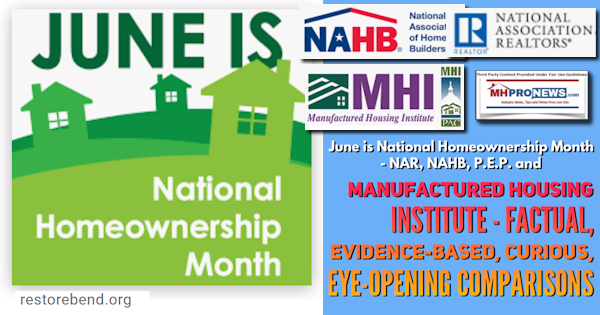
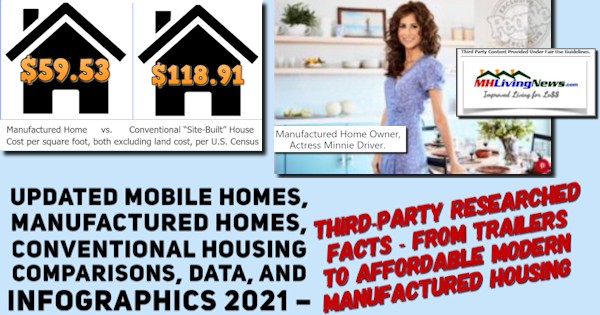
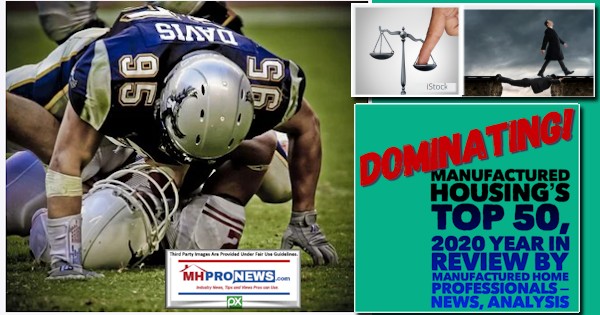 https://www.manufacturedhomepronews.com/dominating-manufactured-housings-top-50-2020-year-in-review-by-manufactured-home-professionals-news-analysis/ [/
https://www.manufacturedhomepronews.com/dominating-manufactured-housings-top-50-2020-year-in-review-by-manufactured-home-professionals-news-analysis/ [/
